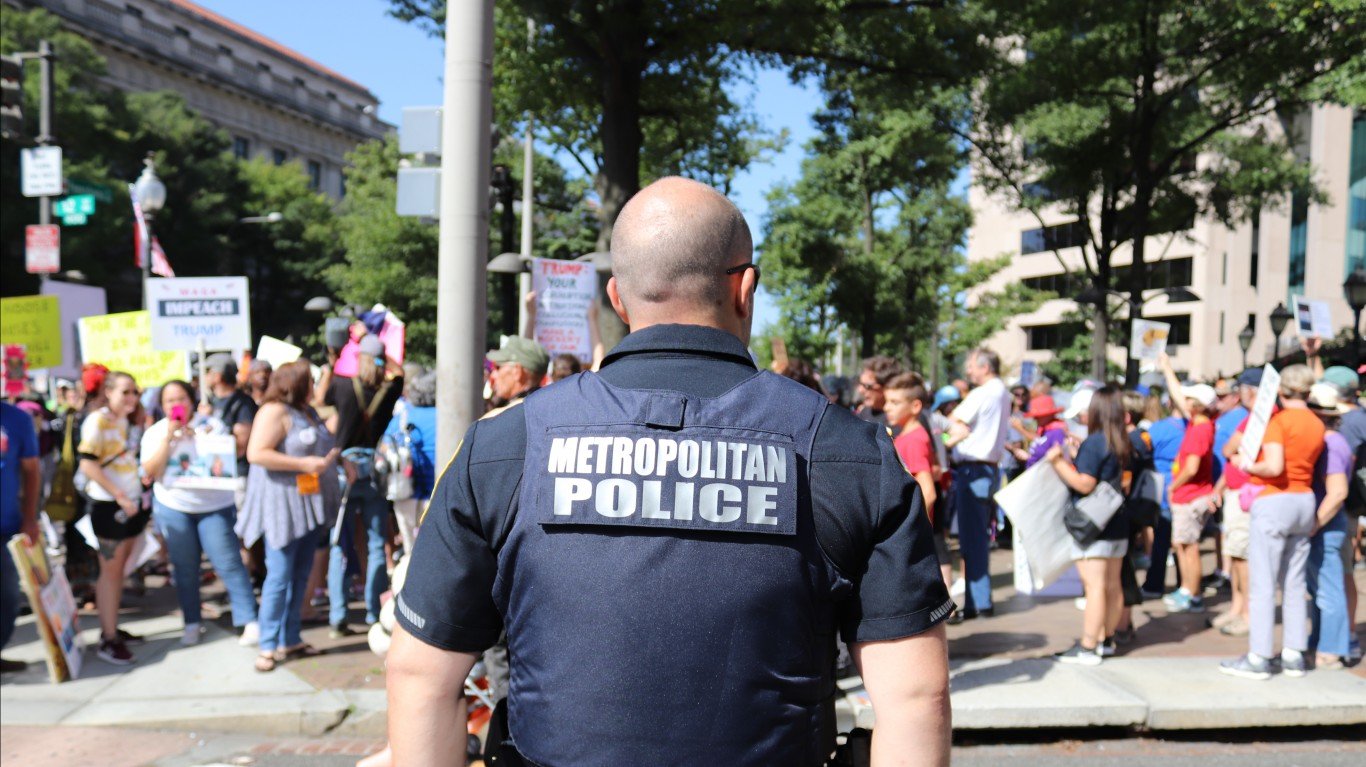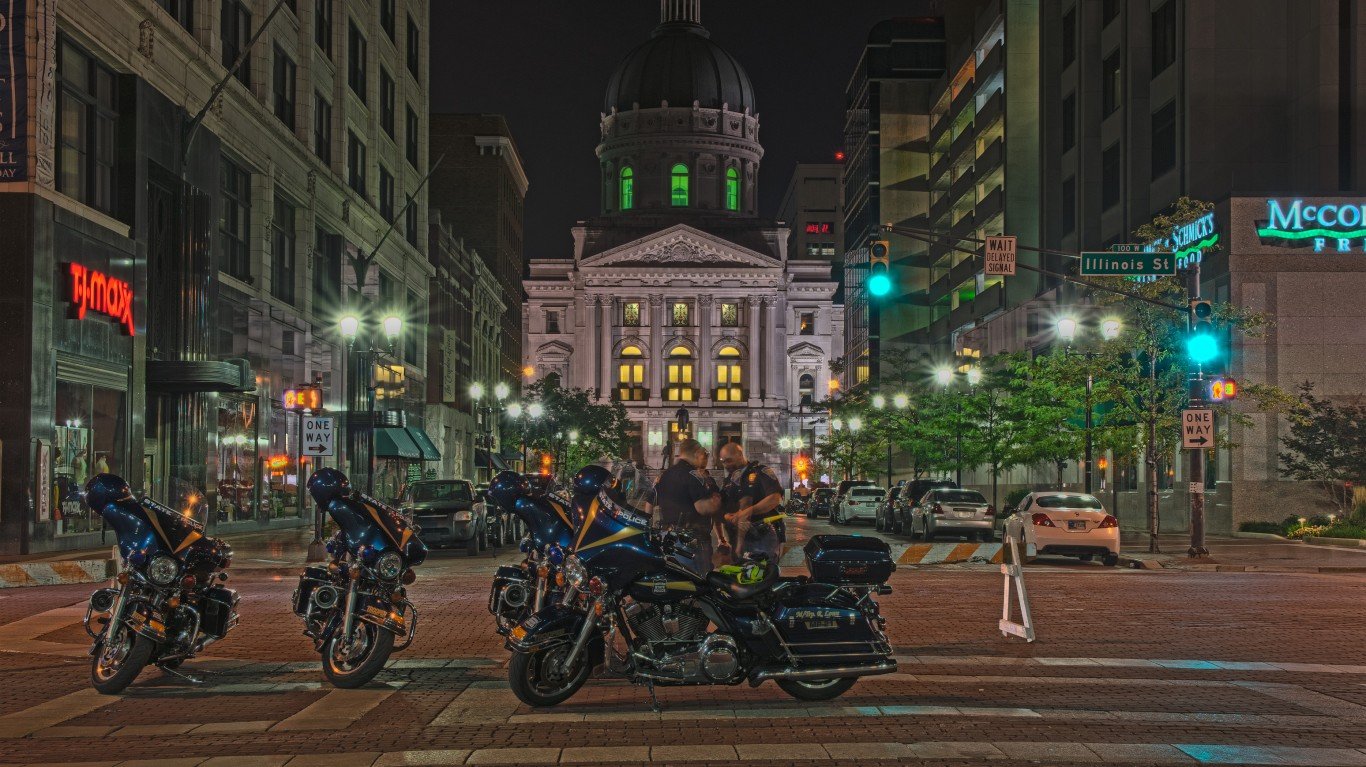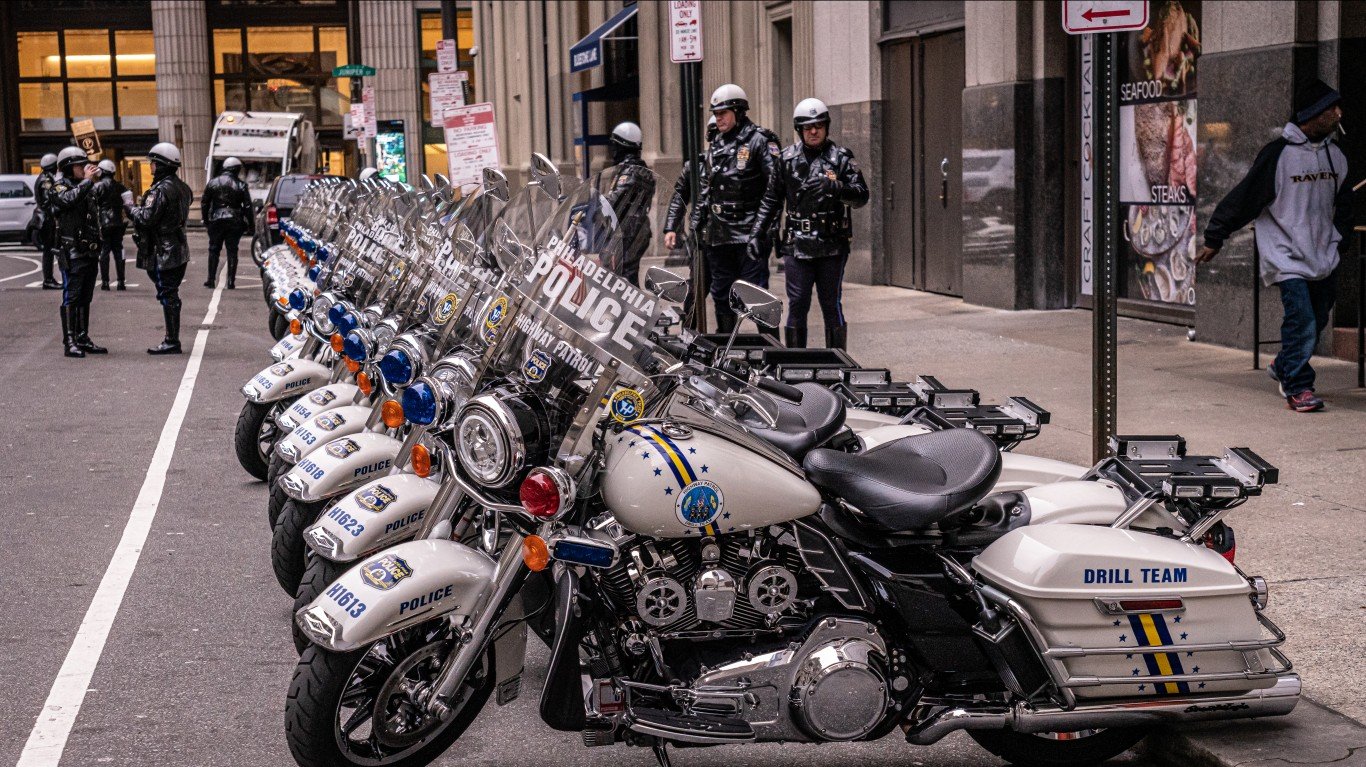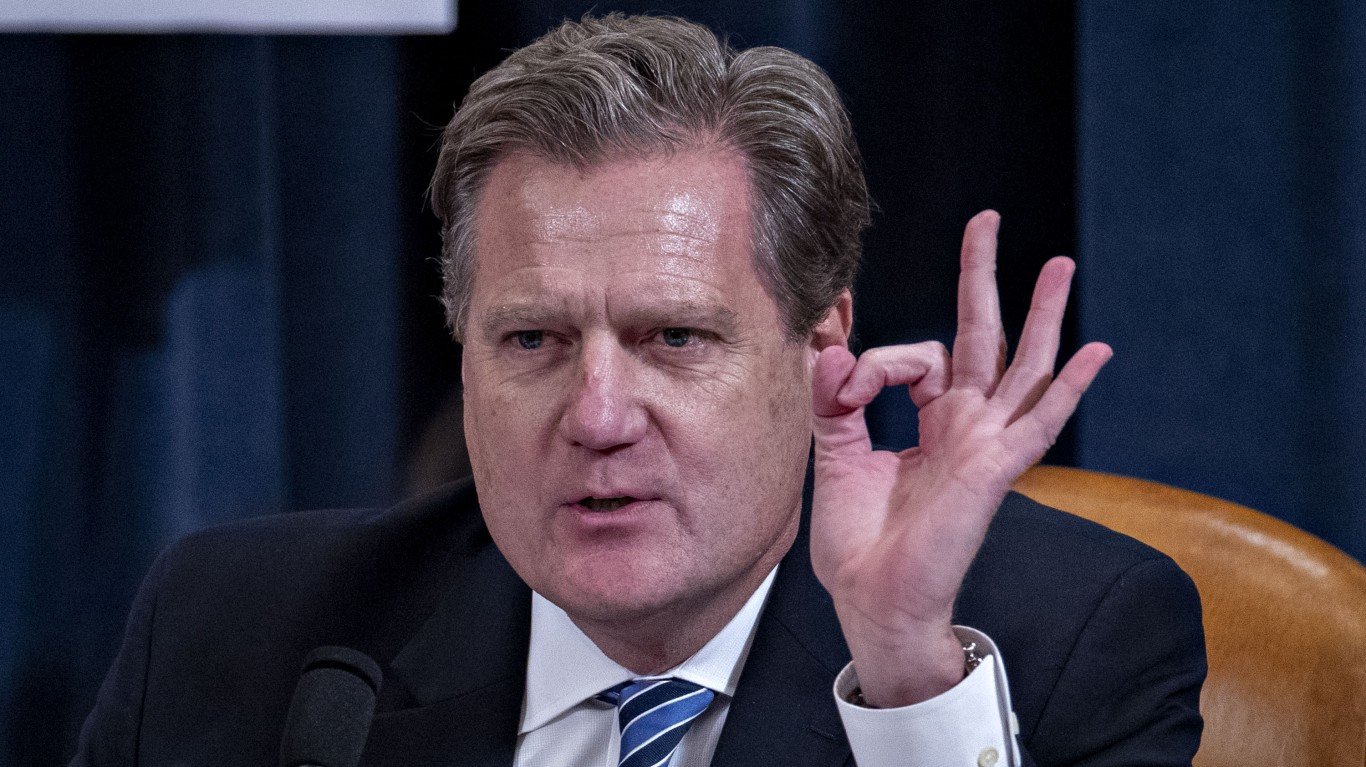

Protesters have taken to the streets across the country in the last month demanding that cities “defund the police” and re-examine use-of-force policies.
The demonstrations, most of them peaceful, were sparked by the killing of George Floyd by a Minneapolis police officer who knelt on his neck for eight minutes 46 seconds as the African American man pleaded, “I can’t breathe.”
The protests also invoked the names of other Black people who have been killed by police, among them:
- Breonna Taylor, an emergency medical technician who was at home asleep when police carried out a “no knock” warrant and shot her eight times.
- Atatiana Jefferson, a pre-med graduate student who was shot as she was babysitting her 8-year-old nephew in her mother’s home.
- Botham Jean, an accountant who was fatally shot as he was eating ice cream in his apartment by an off-duty police officer who said she mistakenly thought it was her apartment.
- Tamir Rice, a 12-year-old boy who was fatally shot in a park after someone reported that he had a gun. It was a BB gun.
- Eric Garner, a Staten Island man who died after a police officer put him in a chokehold. Garner repeatedly said, “I can’t breathe.”
As discussions and debates center on how much money should be allocated for police departments, 24/7 Wall St. reviewed law-enforcement spending in the 50 most populous U.S. cities.
Total police budgets range from just over $100 million a year (Virginia Beach, Virginia) to $5 billion a year (New York City).
Police department appropriations generally account for the largest share of the budget in 35 of the 50 largest cities. But it’s difficult to draw meaningful comparisons between cities because they use wildly different budgeting mechanisms. For example, the huge Las Vegas Metropolitan Police Department budget, $656 million, is funded not only by the city of Las Vegas. Clark County also puts in a significant amount. And there’s an allocated property tax exclusively for funding cops.
In other cities, police departments are funded entirely by the city government. But when comparing the breakdown of city budgets, it’s important to remember that some city governments fund big budget items, like education and health services. In other jurisdictions, those line items are funded outside of the city budget.
In many cities, the largest portion of the police budget is used to cover salaries, benefits, and overtime for officers and civilian employees. Yet police chiefs and city officials often say police pay is inadequate. In 2019, the median pay for a police officer in the United States was $65,170, according to the Bureau of Labor Statistics.
Officials’ response to the protests demanding cuts in police spending have varied. In Tucson, Arizona, the city council has delayed a vote on the 2021 budget so more residents can be heard. In Virginia Beach, Mayor Bobby Dyer wrote an Op-Ed article in The Virginian-Pilot saying: “Defund the police? No way.”
In Albuquerque, New Mexico, the mayor has announced that the city will create a new community safety department that will use unarmed social workers, housing and homelessness specialists, and violence prevention coordinators to respond to nonemergency situations.
And in some cities, like Philadelphia, Dallas, and Long Beach, California, police cutbacks are coming in any case because of budget shortfalls related to the coronavirus pandemic.
Click here to see how much money goes to police departments in America’s largest cities
To identify the police departments with the largest budgets, 24/7 Wall St. reviewed the approved police department budgets in each of the 50 most populous cities in the United States for the latest fiscal year that was available. To compare cities, we ranked each city’s police budget as a percentage of its total operating budget. In some cities, like New York and Chicago, the public school system is included in the city budget. In others, like Los Angeles, it is not.
We excluded capital budgets.
New Orleans, Louisiana
> Population, 2018: 391,006
> Police dept. funding as % of total budget, fiscal year 2020: 17.1% (22nd largest out of 50 largest cities)
> Total police budget for fiscal 2020: $194 million (13th smallest)
> Total city budget for fiscal 2020: $1.13 billion (11th smallest)
> Law enforcement employees per 100K: 373 (31st highest out of 634 cities with 65K +)
> Total law enforcement employees: 1457 (1,209 officers, 248 civilian employees)
> Violent crimes reported per 100K in 2018: 1,163 (24th highest out of 634 cities of 65K +)
Protesters have called for defunding the police department but that would be particularly complicated in New Orleans. In 2013, the New Orleans Police Department and the U.S. Department of Justice entered into a consent decree after an investigation into an alleged pattern of civil rights violations found unconstitutional conduct by the New Orleans Police Department. Operating under a federal monitor, the consent decree forced the police department to do what it was unable to do under local oversight.
The police department gets the biggest chunk of the city budget — $194 million compared with $56 million for community development. Once ranked the most corrupt in the nation, the NOPD “has, against all odds, become a pioneer in humanistic policing,” The Christian Science Monitor wrote last year. The department’s Ethical Policing Is Courageous (EPIC) peer intervention program has won praise. It allows lower ranking officers to confront high ranking ones about their actions without fear of retaliation.
[in-text-ad]

Tampa, Florida
> Population, 2018: 392,905
> Police dept. funding as % of total budget, fiscal year 2020: 15.6% (24th largest out of 50 largest cities)
> Total police budget for fiscal 2020: $163 million (9th smallest)
> Total city budget for fiscal 2020: $1.04 billion (7th smallest)
> Law enforcement employees per 100K: 307 (78th highest out of 634 cities with 65K +)
> Total law enforcement employees: 1,206 (946 officers, 260 civilian employees)
> Violent crimes reported per 100K in 2018: 407 (239th highest out of 634 cities of 65K +)
Tampa recently put a hold on a plan to buy body cameras for all of Tampa’s uniformed police officers up to the rank of corporal because of financial constraints related to the COVID-19 pandemic. Now, the city is refinancing bond obligations and will use a portion of the proceeds to purchase 650 cameras. The aim of the body camera program is to enhance transparency and trust, Mayor Jane Castor said, according to the Tampa Bay Times.

Arlington, Texas
> Population, 2018: 398,122
> Police dept. funding as % of total budget, fiscal year 2020: 21.4% (10th largest out of 50 largest cities)
> Total police budget for fiscal 2020: $118 million (3rd smallest)
> Total city budget for fiscal 2020: $552.06 million (the smallest)
> Law enforcement employees per 100K: 219 (210th highest out of 634 cities with 65K +)
> Total law enforcement employees: 871 (673 officers, 198 civilian employees)
> Violent crimes reported per 100K in 2018: 445 (214th highest out of 634 cities of 65K +)
The Arlington Police Department is one of 15 police departments in the country the U.S. Department of Justice recognized for building trust and working with the community. Even in a community where the community-police relations are supposedly good, large protests formed in the aftermath of the killing of George Floyd by a Minneapolis police officer. In one instance, the Arlington Police Department was damaged and several stores reported break ins. The chaos in the streets was followed by a gathering of the Arlington Clergy and Police Partnership, where prayers were offered for protesters, police officers, and the family of George Floyd.
The city is conducting a national search for a new chief of police. Former Chief Will Johnson announced his retirement in April, effective in June. He was on the police force for 23 years, seven of them as chief.

Tulsa, Oklahoma
> Population, 2018: 401,112
> Police dept. funding as % of total budget, fiscal year 2020: 14.8% (21st smallest out of 50 largest cities)
> Total police budget for fiscal 2021: $123 million (4th smallest)
> Total city budget for fiscal 2021: $828.50 million (5th smallest)
> Law enforcement employees per 100K: 246 (161st highest out of 634 cities with 65K +)
> Total law enforcement employees: 987 (807 officers, 180 civilian employees)
> Violent crimes reported per 100K in 2018: 1,065 (31st highest out of 634 cities of 65K +)
The Tulsa City Council approved an $876,000 increase in the police budget for 2021, even though the overall city budget is being cut by about 3%. About two dozen members of the public commented about the police budget, with two-thirds urging cuts and one-third favoring an increase, The Tulsa World reported. “Industry and the economy have been crippled by a pandemic while society continues to struggle against racism,” Council Chair Ben Kimbro said, according to local TV station KOTV. “But the budget is not just a seasonal effort, it requires hard work and diligence throughout the year.” No money was allocated to run a city agency to monitor Police Department activities and policies. Last year, the city budgeted $246,000 for an Office of the Independent Monitor but never spent it.
[in-text-ad-2]
Minneapolis, Minnesota
> Population, 2018: 425,395
> Police dept. funding as % of total budget, fiscal year 2020: 12.6% (15th smallest out of 50 largest cities)
> Total police budget for fiscal 2020: $193 million (12th smallest)
> Total city budget for fiscal 2020: $1.54 billion (20th smallest)
> Law enforcement employees per 100K: 244 (163rd highest out of 634 cities with 65K +)
> Total law enforcement employees: 1,037 (849 officers, 188 civilian employees)
> Violent crimes reported per 100K in 2018: 793 (77th highest out of 634 cities of 65K +)
The killing of George Floyd by a Minneapolis officer has put the City of Lakes at the center of the nationwide debate on disbanding or defunding police departments. Nine out of 13 Minneapolis City Council members, a veto-proof majority, have voiced support for dismantling the police department. How that would be implemented has yet to be decided. But the debate on police funding was going on long before the Floyd killing. In November, Mayor Jacob Frey’s proposal to add 14 police officers to the force was met with resistance from some council members who wanted the money to be directed to other areas of public safety. Other council members contended that the police force needed to add more officers.
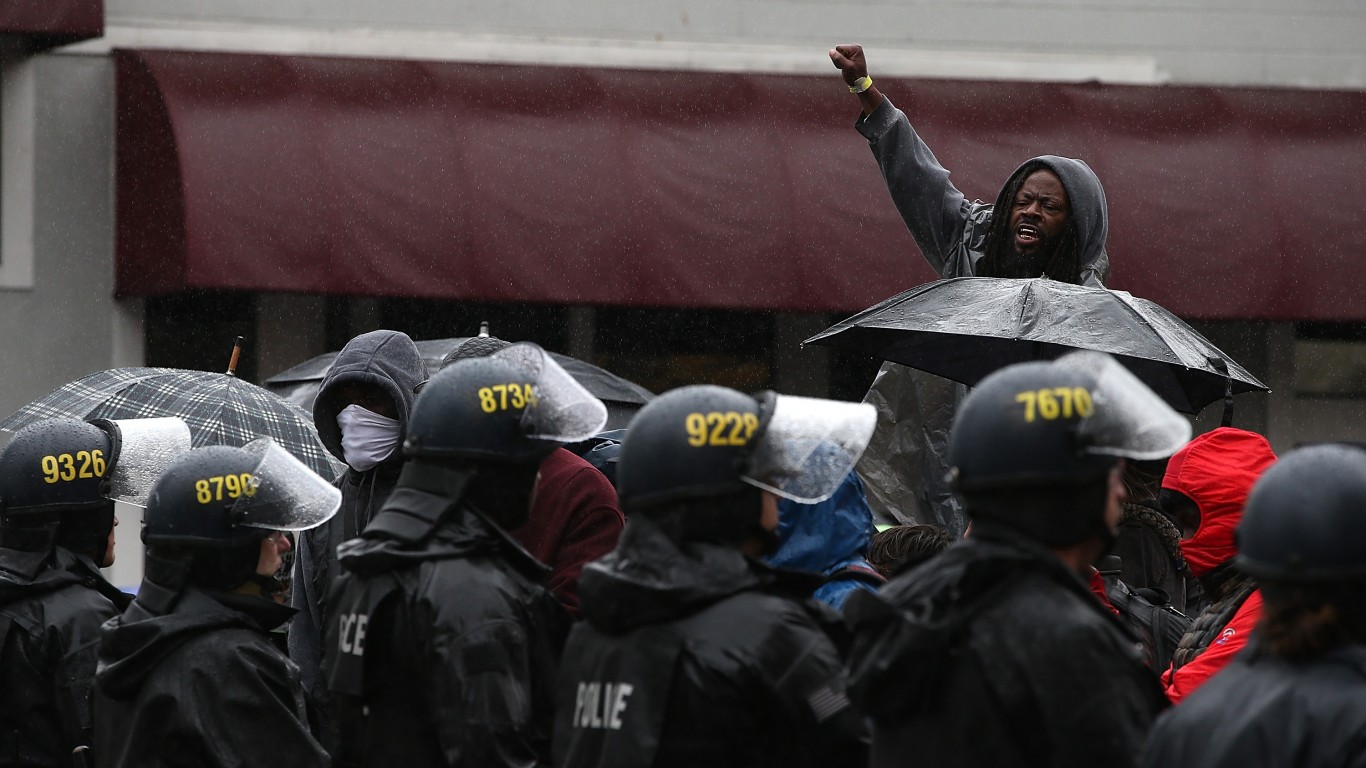
Oakland, California
> Population, 2018: 429,114
> Police dept. funding as % of total budget, fiscal year 2020: 20.0% (13th largest out of 50 largest cities)
> Total police budget for fiscal 2021: $330 million (22nd largest)
> Total city budget for fiscal 2021: $1.65 billion (24th smallest)
> Law enforcement employees per 100K: 235 (176th highest out of 634 cities with 65K +)
> Total law enforcement employees: 1,010 (731 officers, 279 civilian employees)
> Violent crimes reported per 100K in 2018: 1,274 (19th highest out of 634 cities of 65K +)
City Councilmember Nikki Fortunato Bas has called for the diversion of $25 million from the $330 million police budget to community programs, like jobs and housing, local news outlet KRON television reported. In a tweet last week she said: “In the past week, Alameda, San Francisco, Seattle, Portland, Washington DC, Baltimore, Philadelphia and other cities have proposed or pledged to reduce police resources and invest more in community. It’s time, Oakland.”
Interim Police Chief Susan Manheimer has responded that the department gets 28,000 calls a month and asked where the cuts would be made. She added that many civilian employees who respond to such things as mental health calls will not go to the scene without a police escort.
[in-text-ad]
Virginia Beach, Virginia
> Population, 2018: 450,189
> Police dept. funding as % of total budget, fiscal year 2020: 8.7% (5th smallest out of 50 largest cities)
> Total police budget for fiscal 2021: $107 million (the smallest)
> Total city budget for fiscal 2021: $1.23 billion (16th smallest)
> Law enforcement employees per 100K: 212 (237th highest out of 634 cities with 65K +)
> Total law enforcement employees: 953 (778 officers, 175 civilian employees)
> Violent crimes reported per 100K in 2018: 117 (482nd highest out of 634 cities of 65K +)
Virginia Beach spends some 8.7% of its budget on police funds. Following the recent calls for defunding the police, Mayor Bobby Dyer argued in an Op-Ed article in The Virginian-Pilot that, instead of cutting, he’d rather increase police budget to raise officers’ pay, fund body cameras, and increase training. He also noted that the city was the site of a mass shooting at the municipal center in which 12 people were killed. Many residents want the city to rethink the role of the police. The Virginia Beach Interdenominational Ministers Conference has been pushing since 2016 for more racial diversity on the police force and for a racially diverse volunteer Citizens Review Board to examine complaints.
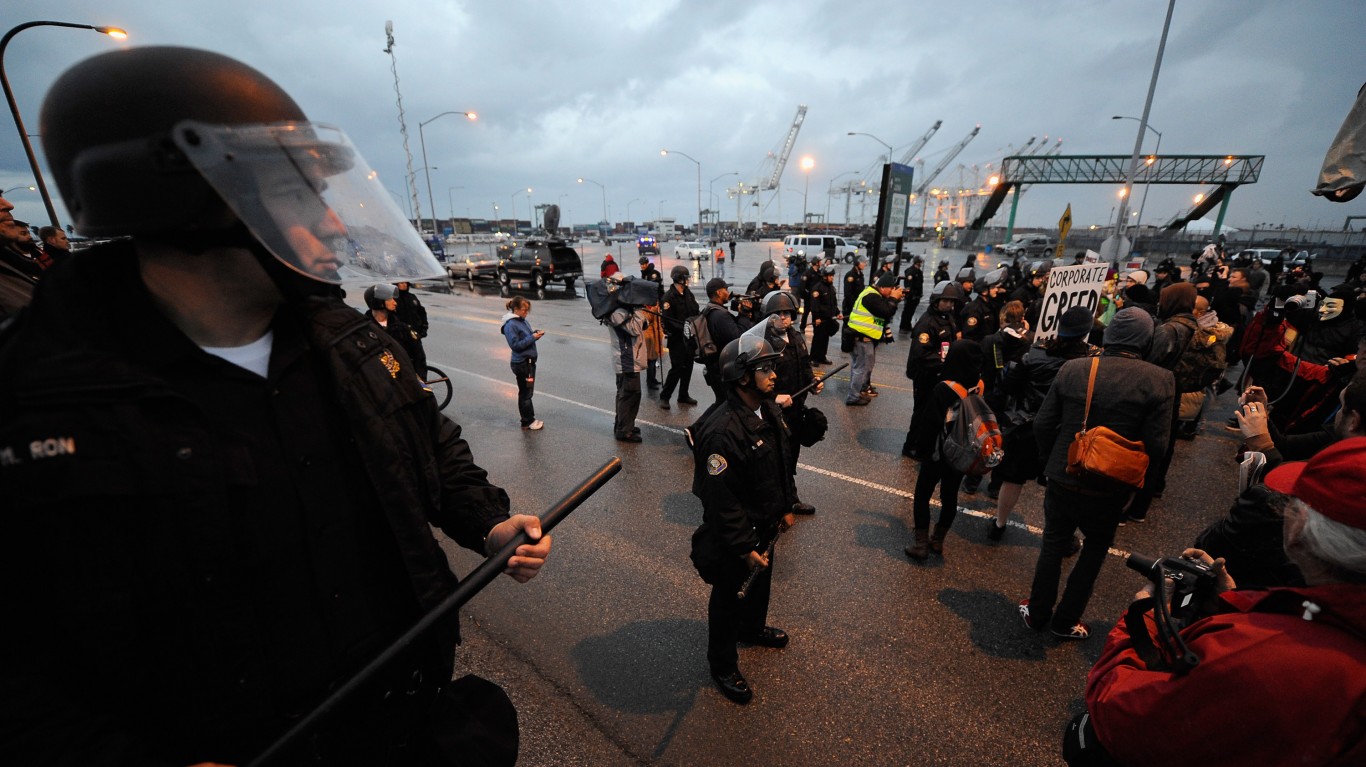
Long Beach, California
> Population, 2018: 467,353
> Police dept. funding as % of total budget, fiscal year 2020: 9.4% (8th smallest out of 50 largest cities)
> Total police budget for fiscal 2020: $264 million (21st smallest)
> Total city budget for fiscal 2020: $2.80 billion (15th largest)
> Law enforcement employees per 100K: 249 (156th highest out of 634 cities with 65K +)
> Total law enforcement employees: 1,164 (824 officers, 340 civilian employees)
> Violent crimes reported per 100K in 2018: 698 (106th highest out of 634 cities of 65K +)
Over the last decade, the budget for the Long Beach Police Department has increased by more than 30%, according to budget documents on the city’s website. In the current fiscal year, police department spending accounts for more than 43% of the city’s discretionary spending, according to The Long Beach Business Journal. The majority of the police department’s budget goes to salaries, benefits, and overtime of about 800 officers and 400 civilians, the Journal said.
The city’s fiscal year begins in October, and protesters have called for cutting police spending in the next budget. City officials say budget cuts are coming — the reason is the coronavirus pandemic — and cuts will not be even across departments. City Manager Tom Modica has asked public safety departments for cuts of 0% to 3.5%, while other departments have been asked for cuts up to 12%, the Long Island Business Journal said.
Omaha, Nebraska
> Population, 2018: 468,267
> Police dept. funding as % of total budget, fiscal year 2020: 14.3% (19th smallest out of 50 largest cities)
> Total police budget for fiscal 2020: $160 million (8th smallest)
> Total city budget for fiscal 2020: $1.12 billion (10th smallest)
> Law enforcement employees per 100K: 217 (221st highest out of 634 cities with 65K +)
> Total law enforcement employees: 1,016 (879 officers, 137 civilian employees)
> Violent crimes reported per 100K in 2018: 560 (153rd highest out of 634 cities of 65K +)
Omaha city officials say they have been inundated with thousands of emails urging them to divert money from the police department “to departments which directly benefit the people of Omaha,” as one message puts it. Councilwoman Aimee Melton told local television station KETV that she had received thousands of emails with the same wording. Councilmember Ben Gray and Anthony Conner, president of the Omaha Police Officers Association, say defunding is unnecessary. Gray pointed to 2019, when the only time officers fired their guns was on Dec. 31, killing a man. Conner told local news outlet KMTV that he and the police chief were already discussing limiting chokeholds.
[in-text-ad-2]
Raleigh, North Carolina
> Population, 2018: 470,509
> Police dept. funding as % of total budget, fiscal year 2020: 11.1% (11th smallest out of 50 largest cities)
> Total police budget for fiscal 2021: $112 million (2nd smallest)
> Total city budget for fiscal 2021: $1.01 billion (6th smallest)
> Law enforcement employees per 100K: 182 (321st highest out of 634 cities with 65K +)
> Total law enforcement employees: 855 (732 officers, 123 civilian employees)
> Violent crimes reported per 100K in 2018: No data
Before the Raleigh City Council approved the 2021 budget, a request was made to increase the proposed appropriation for the police department by $2.8 million. The money would have paid for 28 additional employees in the police department. The request was not approved, although the police budget was not cut. City Councilman Patrick Buffkin said an opportunity had been missed. “I think it would improve policing by hiring social workers and homeless support specialists, along with animal control units,” Buffkin said, according to local news outlet WRAL.
Miami, Florida
> Population, 2018: 470,911
> Police dept. funding as % of total budget, fiscal year 2020: 23.4% (7th largest out of 50 largest cities)
> Total police budget for fiscal 2020: $266 million (22nd smallest)
> Total city budget for fiscal 2020: $1.14 billion (12th smallest)
> Law enforcement employees per 100K: 370 (36th highest out of 634 cities with 65K +)
> Total law enforcement employees: 1,741 (1,309 officers, 432 civilian employees)
> Violent crimes reported per 100K in 2018: 630 (126th highest out of 634 cities of 65K +)
The coronavirus pandemic had already put a strain on most governmental budgets across the country. Then nationwide protests against police brutality following George Floyd’s killing by a Minneapolis police officer required local police departments to spend additional money on overtime. The Miami Police Department has spent more than $1.8 million on police overtime because of the protests, a spokesperson tells Axios. Meanwhile, protesters are encouraging county officials to redirect money from the police department to social services.
[in-text-ad]

Colorado Springs, Colorado
> Population, 2018: 472,666
> Police dept. funding as % of total budget, fiscal year 2020: 20.6% (12th largest out of 50 largest cities)
> Total police budget for fiscal 2020: $141 million (5th smallest)
> Total city budget for fiscal 2020: $682.07 million (2nd smallest)
> Law enforcement employees per 100K: 211 (243rd highest out of 634 cities with 65K +)
> Total law enforcement employees: 995 (702 officers, 293 civilian employees)
> Violent crimes reported per 100K in 2018: 555 (155th highest out of 634 cities of 65K +)
Mayor John Suthers set a goal of hiring 120 additional police officers by 2022 when the 2020 budget was proposed in October 2019. Economic fallout from the COVID-19 pandemic has caused the city to implement a hiring freeze and cut $20 million from its capital budget. Across-the-board wage cuts may also be a possibility. Despite calls from protesters to “defund the police” and the financial challenges, the mayor said, “I’m still trying pursuant to our goal of adding 120 police officers, 32 firefighters by 2022. I still have every hope in the world of doing that.”
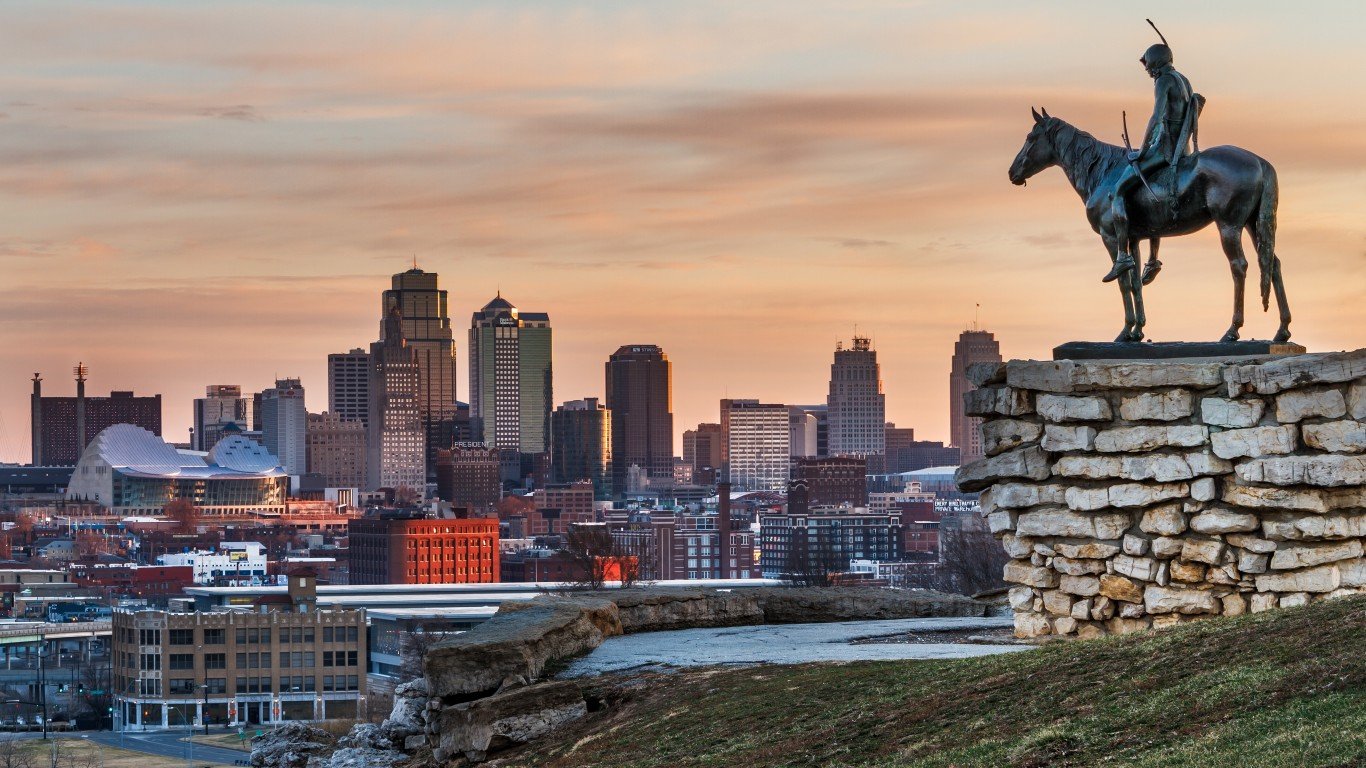
Kansas City, Missouri
> Population, 2018: 491,809
> Police dept. funding as % of total budget, fiscal year 2020: 15.4% (25th largest out of 50 largest cities)
> Total police budget for fiscal 2021: $273 million (24th smallest)
> Total city budget for fiscal 2021: $1.77 billion (25th largest)
> Law enforcement employees per 100K: 370 (34th highest out of 634 cities with 65K +)
> Total law enforcement employees: 1,819 (1,299 officers, 520 civilian employees)
> Violent crimes reported per 100K in 2018: 1,590 (7th highest out of 634 cities of 65K +)
Kansas City officials have asked the police department to cut $10 million from its budget, local news outlet KCTV reports. Acting City Manager Earnest Rouse said in a letter to all city department heads that budget cuts of about 4.5% would be needed from every department because of the COVID-19 pandemic and its effect reducing city revenue. A $10 million budget cut could result in the loss of 212 positions, the police department said. Meanwhile, protesters in Kansas City have called for defunding the police, saying that money would be better spent on education, safety, and health.
Atlanta, Georgia
> Population, 2018: 498,073
> Police dept. funding as % of total budget, fiscal year 2020: 9.3% (7th smallest out of 50 largest cities)
> Total police budget for fiscal 2020: $205 million (16th smallest)
> Total city budget for fiscal 2020: $2.20 billion (20th largest)
> Law enforcement employees per 100K: 399 (22nd highest out of 634 cities with 65K +)
> Total law enforcement employees: 1,987 (1,535 officers, 452 civilian employees)
> Violent crimes reported per 100K in 2018: 769 (80th highest out of 634 cities of 65K +)
As city officials consider the budget for fiscal year 2021, Mayor Keisha Lance Bottoms says she will not defund the police department. Instead, she said, she will divert money from the Department of Corrections to social services. The mayor intends to reduce the $19 million proposed corrections budget to $4 million, according to local news outlet WABE. The money cut will be redirected to the Office of Constituent Services.
[in-text-ad-2]

Sacramento, California
> Population, 2018: 508,517
> Police dept. funding as % of total budget, fiscal year 2020: 13.6% (16th smallest out of 50 largest cities)
> Total police budget for fiscal 2021: $158 million (6th smallest)
> Total city budget for fiscal 2021: $1.16 billion (13th smallest)
> Law enforcement employees per 100K: 186 (302nd highest out of 634 cities with 65K +)
> Total law enforcement employees: 948 (651 officers, 297 civilian employees)
> Violent crimes reported per 100K in 2018: 657 (117th highest out of 634 cities of 65K +)
Debate on police funding in Sacramento centers on how proceeds from the Measure U sales tax are being used. The city’s 1-cent sales tax, which took effect on April 1, 2019, was approved in a ballot measure in 2018. Legally, the money can be used for any core city service, but the sales tax was presented to voters as a means to support “inclusive economic development projects” and to uplift underserved neighborhoods, according to The Sacramento Bee. Now, because of economic repercussions of the COVID-19 pandemic, $45.7 million from the sales tax is slated to go to the police department. Some community activists say the police department’s budget should be cut by up to $50 million.

Mesa, Arizona
> Population, 2018: 508,979
> Police dept. funding as % of total budget, fiscal year 2020: 10.6% (10th smallest out of 50 largest cities)
> Total police budget for fiscal 2021: $202 million (15th smallest)
> Total city budget for fiscal 2021: $1.91 billion (23rd largest)
> Law enforcement employees per 100K: 236 (174th highest out of 634 cities with 65K +)
> Total law enforcement employees: 1,202 (779 officers, 423 civilian employees)
> Violent crimes reported per 100K in 2018: 364 (282nd highest out of 634 cities of 65K +)
The Mesa City Council adopted a 2021 budget in May that raises police spending by $8.5 million, according to budget documents. In June, hundreds of demonstrators marched to police headquarters, demanding de-escalation training and a smaller police budget. Among the protesters was Laney Sweet, the widow of Daniel Shaver, who in 2016 was fatally shot by police while on a business trip to Mesa. His last words were reportedly: “Please, don’t shoot me. Yes, sir.” Both Shaver and Police Officer Philip Brailsford were white. Brailsford was fired, later reinstated then retired with a $31,000 a year pension. The incident was not the only one in recent years where the Mesa police use of force had been questioned, and the FBI had launched an investigation into these incidents in 2018.
[in-text-ad]
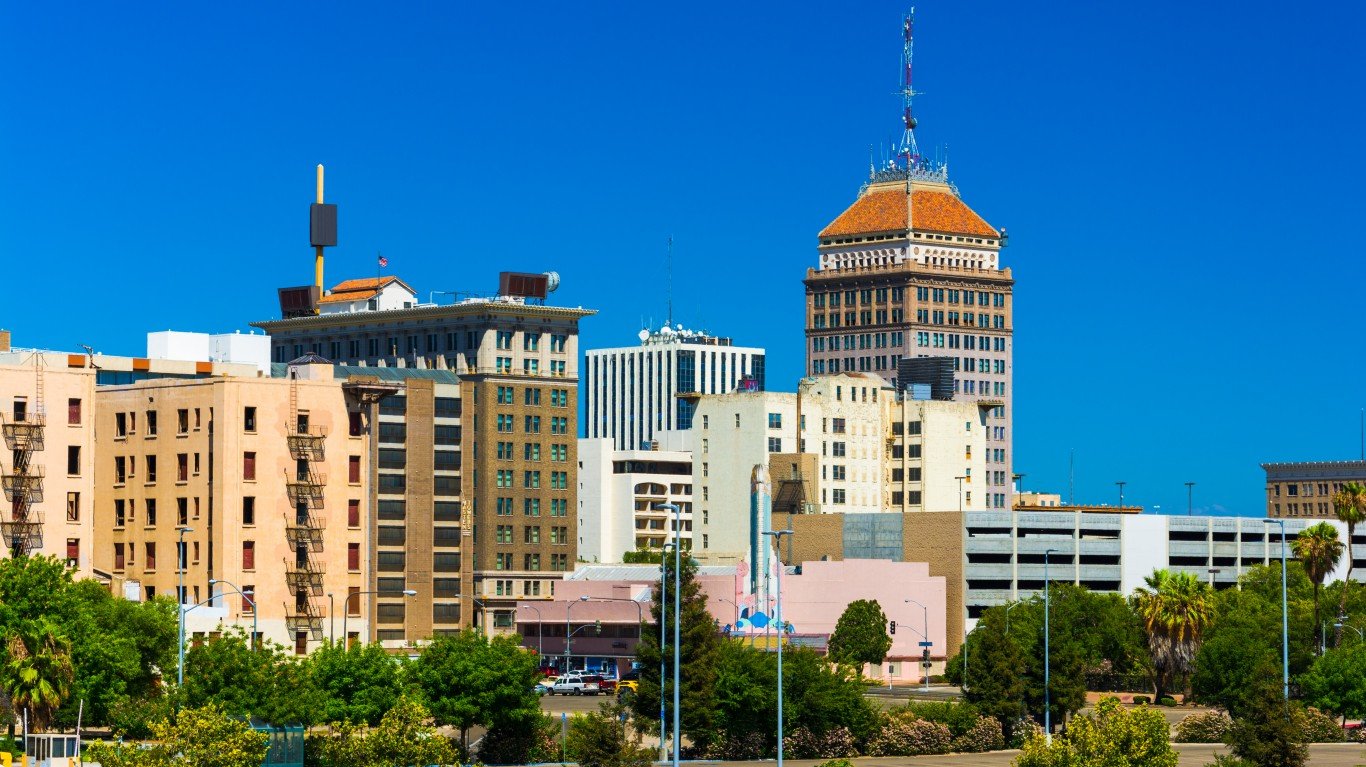
Fresno, California
> Population, 2018: 530,073
> Police dept. funding as % of total budget, fiscal year 2020: 17.0% (23rd largest out of 50 largest cities)
> Total police budget for fiscal 2020: $202 million (14th smallest)
> Total city budget for fiscal 2020: $1.19 billion (14th smallest)
> Law enforcement employees per 100K: 201 (275th highest out of 634 cities with 65K +)
> Total law enforcement employees: 1,063 (811 officers, 252 civilian employees)
> Violent crimes reported per 100K in 2018: 555 (156th highest out of 634 cities of 65K +)
The Fresno City Council’s budget hearing, held via Zoom, had more than 100 members of the public commenting on the police budget, the Fresno Bee reported. Almost everyone urged the council to cut police spending and redirect money to other city services. Many people asked why the police respond to every 911 call, even ones that do not involve crime. Questions were raised about whether social workers would be more appropriate responders for situations involving people who are homeless or mentally ill. Police Chief Andy Hall said his department receives 1,200 emergency calls per day and 1,500 to 1,700 for nonemergencies.
Tucson, Arizona
> Population, 2018: 545,987
> Police dept. funding as % of total budget, fiscal year 2020: 12.4% (14th smallest out of 50 largest cities)
> Total police budget for fiscal 2020: $193 million (11th smallest)
> Total city budget for fiscal 2020: $1.56 billion (22nd smallest)
> Law enforcement employees per 100K: 186 (303rd highest out of 634 cities with 65K +)
> Total law enforcement employees: 1,015 (807 officers, 208 civilian employees)
> Violent crimes reported per 100K in 2018: 737 (92nd highest out of 634 cities of 65K +)
The Tucson City Council has delayed action on its 2021 budget so it can hear more comments from members of the community, particularly related to the proposed police budget, The Arizona Republic reported. Protests in Tucson after the killing of George Floyd by a police officer in Minneapolis have raised questions about police policies and tactics. The use of full riot gear and tear gas by Tucson police during protests has sparked criticism among residents. The council has been urged to move money from the police department to social services.
“It’s vital right now for you all, as our representatives, to reflect on the extent to which the militarized and violent culture of law enforcement is directly tied to the exorbitant amount of funding that they receive from bodies like our City Council,” Paco Cantu, a former U.S. Border Patrol agent, said at a recent live-streamed meeting, according to the newspaper.
Albuquerque, New Mexico
> Population, 2018: 560,234
> Police dept. funding as % of total budget, fiscal year 2020: 18.9% (15th largest out of 50 largest cities)
> Total police budget for fiscal 2020: $210 million (17th smallest)
> Total city budget for fiscal 2020: $1.11 billion (9th smallest)
> Law enforcement employees per 100K: N/A
> Total law enforcement employees: N/A
> Violent crimes reported per 100K in 2018: 1,365 (14th highest out of 634 cities of 65K +)
Albuquerque Mayor Tim Keller announced in June that the city is creating a new public safety department that will respond to nonemergency calls, like inebriation, homelessness, addiction, and mental health, The Washington Post reported. The department, called Albuquerque Community Safety, will employ unarmed social workers, housing and homelessness specialists, and violence prevention coordinators.
Albuquerque spends more than $300 million on public safety, two-thirds of which goes to the police department, The Post said. Police Chief Mike Geier said officers were “relieved” that some of their calls would become the responsibility of the new department. A federal monitor has been reviewing police operations since 2014 because of what the Department of Justice called “a culture of aggression.”
[in-text-ad-2]
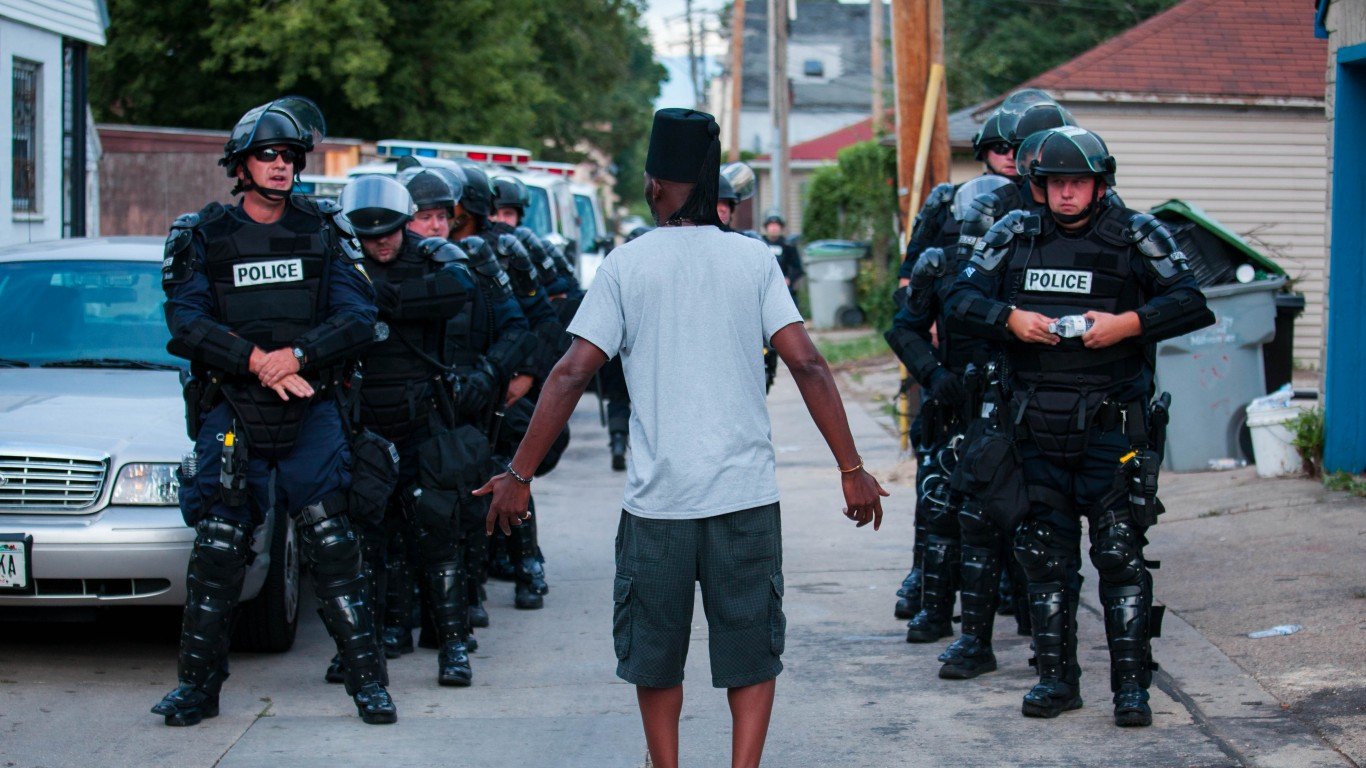
Milwaukee, Wisconsin
> Population, 2018: 592,002
> Police dept. funding as % of total budget, fiscal year 2020: 18.5% (17th largest out of 50 largest cities)
> Total police budget for fiscal 2020: $297 million (24th largest)
> Total city budget for fiscal 2020: $1.61 billion (23rd smallest)
> Law enforcement employees per 100K: 389 (25th highest out of 634 cities with 65K +)
> Total law enforcement employees: 2,305 (1,851 officers, 454 civilian employees)
> Violent crimes reported per 100K in 2018: 1,413 (11th highest out of 634 cities of 65K +)
The Milwaukee Common Council is looking into a 10% reduction in the police budget, according to The Milwaukee Journal Sentinel. Eleven of the council’s 15 members have signed on to legislation directing the city’s budget director to create a draft budget for 2021 with the 10% cut. The lead sponsor of the measure, Alderman José Pérez, said the proposal was a response to protesters who have demanded change in the aftermath of the George Floyd killing by a Minneapolis police officer. The 2020 police budget of $297.4 million is by far the largest departmental budget in the city.
Baltimore, Maryland
> Population, 2018: 602,495
> Police dept. funding as % of total budget, fiscal year 2020: 18.3% (18th largest out of 50 largest cities)
> Total police budget for fiscal 2020: $536 million (11th largest)
> Total city budget for fiscal 2020: $2.93 billion (14th largest)
> Law enforcement employees per 100K: 487 (8th highest out of 634 cities with 65K +)
> Total law enforcement employees: 2,935 (2,488 officers, 447 civilian employees)
> Violent crimes reported per 100K in 2018: 1,833 (4th highest out of 634 cities of 65K +)
The Baltimore City Council voted to cut $22 million from the police budget in 2021, The Baltimore Sun reported. The mounted unit and the marine unit will be eliminated. The plan also calls for cutting the 2020 overtime spending of $40 million to $26 million in 2021. The police department had proposed a $7 million cut in overtime, but the council increased that to $14 million. Even with the cuts, Baltimore’s police budget will be about half a billion dollars.
[in-text-ad]

Louisville/Jefferson County metro government (balance), Kentucky
> Population, 2018: 620,149
> Police dept. funding as % of total budget, fiscal year 2020: 25.2% (6th largest out of 50 largest cities)
> Total police budget for fiscal 2020: $190 million (10th smallest)
> Total city budget for fiscal 2020: $752.48 million (4th smallest)
> Law enforcement employees per 100K: 248 (157th highest out of 634 cities with 65K +)
> Total law enforcement employees: 1,538 (1,246 officers, 292 civilian employees)
> Violent crimes reported per 100K in 2018: No data
The Louisville Metro Police Department has been the focus of protests calling for officials to defund the police because of the killing of Breonna Taylor, an emergency medical technician who was shot eight times in her apartment as the police carried out a “no knock” warrant. Government officials, however, said they will not significantly decrease the amount of money spent on law enforcement, the Louisville Courier Journal reported.
Las Vegas, Nevada
> Population, 2018: 644,664
> Police dept. funding as % of total budget, fiscal year 2020: 44.9% (the largest out of 50 largest cities)
> Total police budget for fiscal 2021: $656 million (8th largest)
> Total city budget for fiscal 2021: $1.46 billion (17th smallest)
> Law enforcement employees per 100K: N/A
> Total law enforcement employees: N/A
> Violent crimes reported per 100K in 2018: No data
Confronting a potential $147 million budget shortfall over the next 16 months, Las Vegas recently cut its general fund budget for the next fiscal year by $124 million. To save money, the Las Vegas Metropolitan Police Department laid off some part-time workers and its mounted patrol unit. The department’s long-term goal of providing two officers per every 1,000 residents could be in jeopardy due to the budget crunch.

Oklahoma City, Oklahoma
> Population, 2018: 649,410
> Police dept. funding as % of total budget, fiscal year 2020: 13.6% (17th smallest out of 50 largest cities)
> Total police budget for fiscal 2021: $226 million (18th smallest)
> Total city budget for fiscal 2021: $1.66 billion (25th smallest)
> Law enforcement employees per 100K: 213 (236th highest out of 634 cities with 65K +)
> Total law enforcement employees: 1,382 (1,102 officers, 280 civilian employees)
> Violent crimes reported per 100K in 2018: 867 (60th highest out of 634 cities of 65K +)
In a tale of two cities, Oklahoma City and neighboring Norman responded differently to calls for defunding the police. While smaller Norman voted to cut $865,000 from its police budget in the next fiscal year, Oklahoma City Council approved its new budget without any cuts to police. Still, to save costs in a time of declining revenues, the budget reflects that 34 vacant police positions will go unfilled.
[in-text-ad-2]

Memphis, Tennessee
> Population, 2018: 650,632
> Police dept. funding as % of total budget, fiscal year 2020: 38.3% (2nd largest out of 50 largest cities)
> Total police budget for fiscal 2020: $273 million (23rd smallest)
> Total city budget for fiscal 2020: $711.56 million (3rd smallest)
> Law enforcement employees per 100K: 400 (21st highest out of 634 cities with 65K +)
> Total law enforcement employees: 2,605 (1,995 officers, 610 civilian employees)
> Violent crimes reported per 100K in 2018: 1,943 (2nd highest out of 634 cities of 65K +)
Memphis Mayor Jim Strickland supports expansion of education and community programs, but not at the expense of the police department. He recently said law enforcement needs more officers who are better paid and better trained. In mid-June, a group of protesters camped out in front of City Hall. They pushed for the reallocation of some police funds and for the adoption of the “8 Can’t Wait” policies, which include de-escalation techniques and comprehensive reporting.
Portland, Oregon
> Population, 2018: 652,573
> Police dept. funding as % of total budget, fiscal year 2020: 4.4% (2nd smallest out of 50 largest cities)
> Total police budget for fiscal 2021: $245 million (19th smallest)
> Total city budget for fiscal 2021: $5.52 billion (7th largest)
> Law enforcement employees per 100K: 180 (329th highest out of 634 cities with 65K +)
> Total law enforcement employees: 1,177 (922 officers, 255 civilian employees)
> Violent crimes reported per 100K in 2018: 520 (170th highest out of 634 cities of 65K +)
The city of Portland’s new budget slashes its police budget by $15 million, which will result in the loss of about 84 positions. Some activists had been demanding a cut of $50 million. Before protests erupted after the killing of George Floyd, the city’s budget had called for a $3 million increase in police funding. Prior to voting on the budget, the city council heard from hundreds of citizens pushing for reallocating some law enforcement funds.
[in-text-ad]
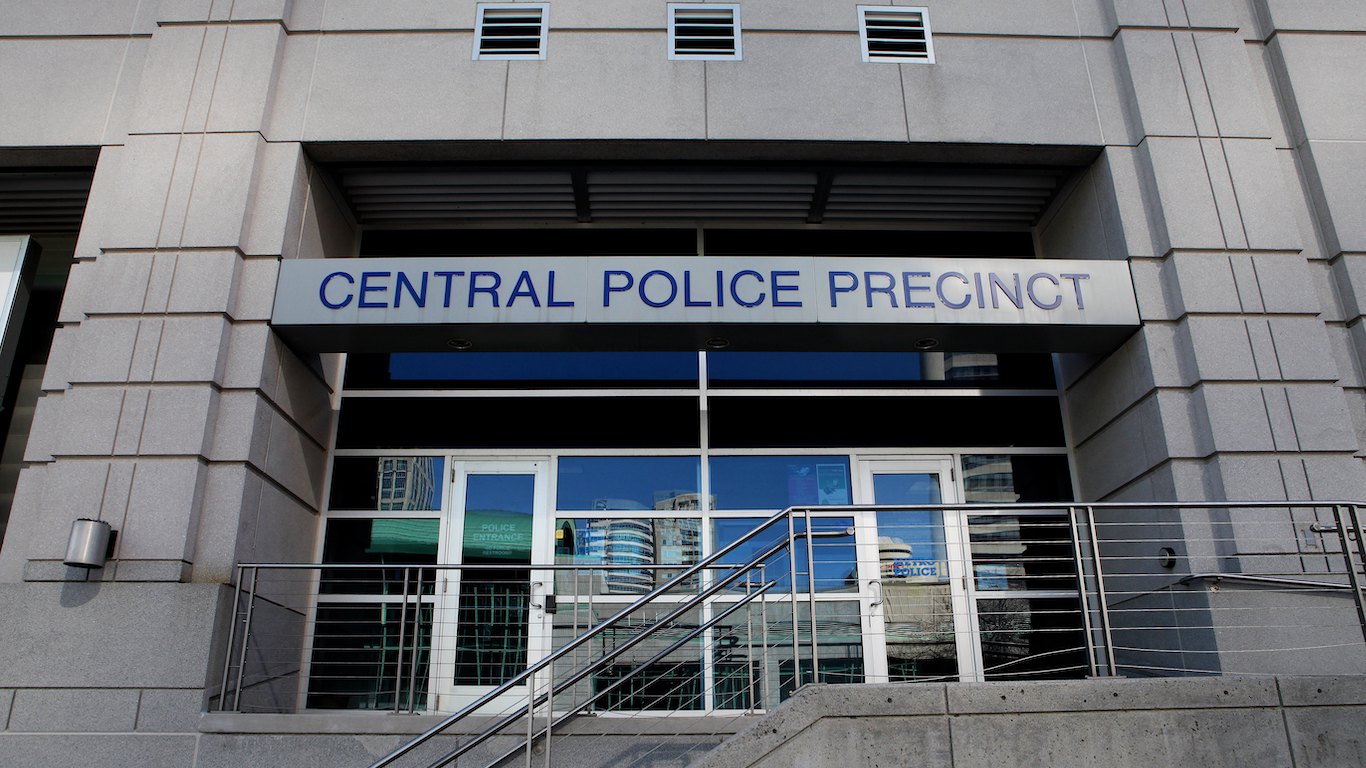
Nashville-Davidson metropolitan government (balance), Tennessee
> Population, 2018: 665,498
> Police dept. funding as % of total budget, fiscal year 2020: 11.8% (13th smallest out of 50 largest cities)
> Total police budget for fiscal 2021: $289 million (25th smallest)
> Total city budget for fiscal 2021: $2.45 billion (18th largest)
> Law enforcement employees per 100K: 264 (120th highest out of 634 cities with 65K +)
> Total law enforcement employees: 1,757 (1,435 officers, 322 civilian employees)
> Violent crimes reported per 100K in 2018: 1,113 (27th highest out of 634 cities of 65K +)
Taking effect July 1, Nashville’s new budget increases police spending by about $2.6 million. The additional funds will be used to hire 48 new recruits. One city council member’s proposal to slash the police budget in half did not get much support. This year’s budget includes $2.1 million to buy body cameras for all officers. Advocates say cameras are an essential tool for monitoring police behavior.

Detroit, Michigan
> Population, 2018: 672,681
> Police dept. funding as % of total budget, fiscal year 2020: 15.1% (23rd smallest out of 50 largest cities)
> Total police budget for fiscal 2021: $317 million (23rd largest)
> Total city budget for fiscal 2021: $2.10 billion (21st largest)
> Law enforcement employees per 100K: 449 (13th highest out of 634 cities with 65K +)
> Total law enforcement employees: 3,019 (2,398 officers, 621 civilian employees)
> Violent crimes reported per 100K in 2018: 2,008 (the highest out of 634 cities of 65K +)
While Michigan Gov. Gretchen Whitmer does not support “defunding” the state’s police departments, she would like to see more investments in health care, schools, and transportation. In Detroit, Police Chief James Craig is supportive of this idea but not at the expense of cops. He pointed out that his department struggled to do its job during the city’s bankruptcy period of 2013-2014 that forced budget cuts.

El Paso, Texas
> Population, 2018: 682,686
> Police dept. funding as % of total budget, fiscal year 2020: 15.1% (22nd smallest out of 50 largest cities)
> Total police budget for fiscal 2020: $158 million (7th smallest)
> Total city budget for fiscal 2020: $1.05 billion (8th smallest)
> Law enforcement employees per 100K: 196 (280th highest out of 634 cities with 65K +)
> Total law enforcement employees: 1,341 (1,103 officers, 238 civilian employees)
> Violent crimes reported per 100K in 2018: 371 (275th highest out of 634 cities of 65K +)
El Paso police faced criticism after using tear gas and non-lethal rounds to disperse protesters on May 31. The police said they reacted after some members of the crowd became unruly and threw bottles at officers. A state senator urged the El Paso City Council to conduct an independent investigation into the incident. The city manager has now been tasked with exploring the idea of a civilian review board.
The police department is the largest line item in El Paso’s budget, followed by the fire department and mass transit.
[in-text-ad-2]
Boston, Massachusetts
> Population, 2018: 695,926
> Police dept. funding as % of total budget, fiscal year 2020: 10.3% (9th smallest out of 50 largest cities)
> Total police budget for fiscal 2021: $375 million (19th largest)
> Total city budget for fiscal 2021: $3.65 billion (11th largest)
> Law enforcement employees per 100K: 390 (24th highest out of 634 cities with 65K +)
> Total law enforcement employees: 2,715 (2,122 officers, 593 civilian employees)
> Violent crimes reported per 100K in 2018: 622 (130th highest out of 634 cities of 65K +)
Boston is moving forward with plans to cut a specific part of the police department’s budget — overtime. The pay of officers working overtime can amount to significant amounts at departments across the country. City officials are looking at a 20% cut (about $12 million). The funds would be diverted to health, addressing homelessness, and business development.
Washington, District of Columbia
> Population, 2018: 702,455
> Police dept. funding as % of total budget, fiscal year 2020: 3.3% (the smallest out of 50 largest cities)
> Total police budget for fiscal 2021: $544 million (10th largest)
> Total city budget for fiscal 2021: $16.70 billion (2nd largest)
> Law enforcement employees per 100K: 643 (2nd highest out of 634 cities with 65K +)
> Total law enforcement employees: 4,520 (3,841 officers, 679 civilian employees)
> Violent crimes reported per 100K in 2018: 941 (49th highest out of 634 cities of 65K +)
As the home to the federal government, Washington D.C. has been one of the epicenters of the Black Lives Matter movement. Mayor Muriel Bowser has publicly feuded with President Donald Trump over activities by federal law enforcement in the city. Still, Bowser has confidence that the local Metropolitan Police Department has mostly good relationships with the community. According to police Chief Peter Newsham, his department has been actively reforming its policies since 2002. In recent years, the city has increased the use of officers on foot and bikes, and invested in a neighborhood engagement program.
[in-text-ad]
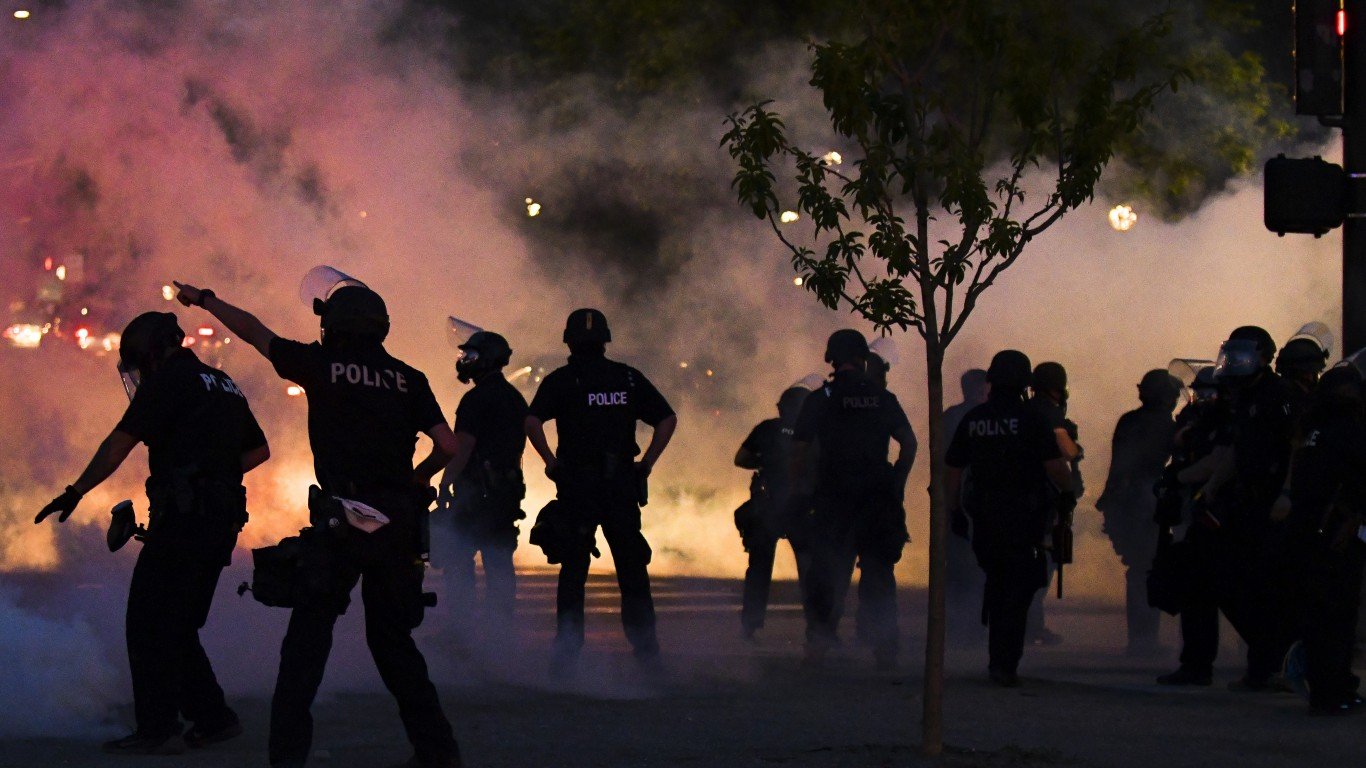
Denver, Colorado
> Population, 2018: 716,492
> Police dept. funding as % of total budget, fiscal year 2020: 28.6% (4th largest out of 50 largest cities)
> Total police budget for fiscal 2020: $426 million (16th largest)
> Total city budget for fiscal 2020: $1.49 billion (18th smallest)
> Law enforcement employees per 100K: 255 (138th highest out of 634 cities with 65K +)
> Total law enforcement employees: 1,824 (1,517 officers, 307 civilian employees)
> Violent crimes reported per 100K in 2018: 730 (97th highest out of 634 cities of 65K +)
Denver Mayor Michael Hancock says his city had changed its use-of-force policies before the current protests. According to 5280 magazine, Denver already meets the “8 Can’t Wait” measures suggested by a national reform campaign. He acknowledged, though, that more needs to be done. Hancock endorses the police department’s program that sometimes deploys social workers along with officers on calls. At least two city council members have said they favor reallocating some law enforcement dollars to social programs.
Seattle, Washington
> Population, 2018: 744,949
> Police dept. funding as % of total budget, fiscal year 2020: 27.2% (5th largest out of 50 largest cities)
> Total police budget for fiscal 2020: $409 million (17th largest)
> Total city budget for fiscal 2020: $1.50 billion (19th smallest)
> Law enforcement employees per 100K: 262 (123rd highest out of 634 cities with 65K +)
> Total law enforcement employees: 1,954 (1,420 officers, 534 civilian employees)
> Violent crimes reported per 100K in 2018: 680 (111th highest out of 634 cities of 65K +)
Seattle has become a hotspot in the national debate over police tactics as activists established the Capitol Hill Autonomous Zone (CHAZ). The small so-called “police free” area has attracted a great deal of media attention. Some city council members are proposing a 50% reduction in police spending and diverting those funds to community programs. The mayor has opposed such a drastic hit but has pledged to find at least $100 million for new social initiatives.
Indianapolis, Indiana
> Population, 2018: 864,131
> Police dept. funding as % of total budget, fiscal year 2020: 20.9% (11th largest out of 50 largest cities)
> Total police budget for fiscal 2020: $254 million (20th smallest)
> Total city budget for fiscal 2020: $1.21 billion (15th smallest)
> Law enforcement employees per 100K: 365 (38th highest out of 634 cities with 65K +)
> Total law enforcement employees: 3,153 (2,616 officers, 537 civilian employees)
> Violent crimes reported per 100K in 2018: 1,273 (20th highest out of 634 cities of 65K +)
The ACLU is among the organizations lobbying Indianapolis to reduce police spending in its budget. The mayor will present a new financial outline for the city in August. In the meantime, the Indianapolis Metropolitan Police Department is revising its use-of-force policy. The city may also create a review board to review allegations of police misconduct.
Last year’s budget included funding for policy body cameras, and the department says those will be introduced this summer.
[in-text-ad-2]
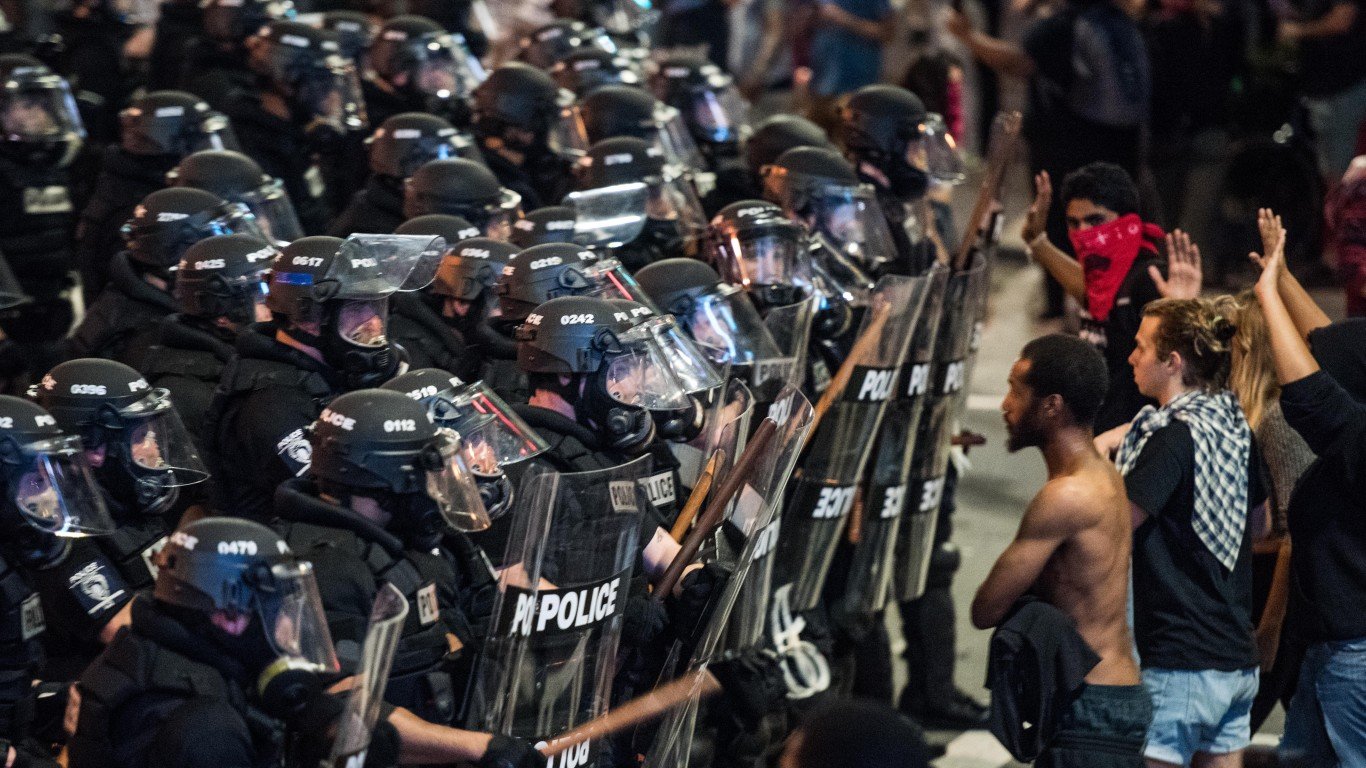
Charlotte, North Carolina
> Population, 2018: 872,506
> Police dept. funding as % of total budget, fiscal year 2020: 11.4% (12th smallest out of 50 largest cities)
> Total police budget for fiscal 2021: $290 million (25th largest)
> Total city budget for fiscal 2021: $2.55 billion (17th largest)
> Law enforcement employees per 100K: 268 (112th highest out of 634 cities with 65K +)
> Total law enforcement employees: 2,342 (1,817 officers, 525 civilian employees)
> Violent crimes reported per 100K in 2018: 00 (536th highest out of 634 cities of 65K +)
Police departments in many cities have faced scrutiny over the use of chemical agents to disperse crowds, and Charlotte is no exception. After the Charlotte-Mecklenburg Police Department used tear gas in June, the city council voted to ban the purchase of such substances going forward. The council also instructed the city manager to oversee an effort to align police policies with the “8 Can’t Wait” movement, which calls for eight concrete police reforms, including banning chokeholds and shooting from moving vehicles as well as comprehensive reporting.
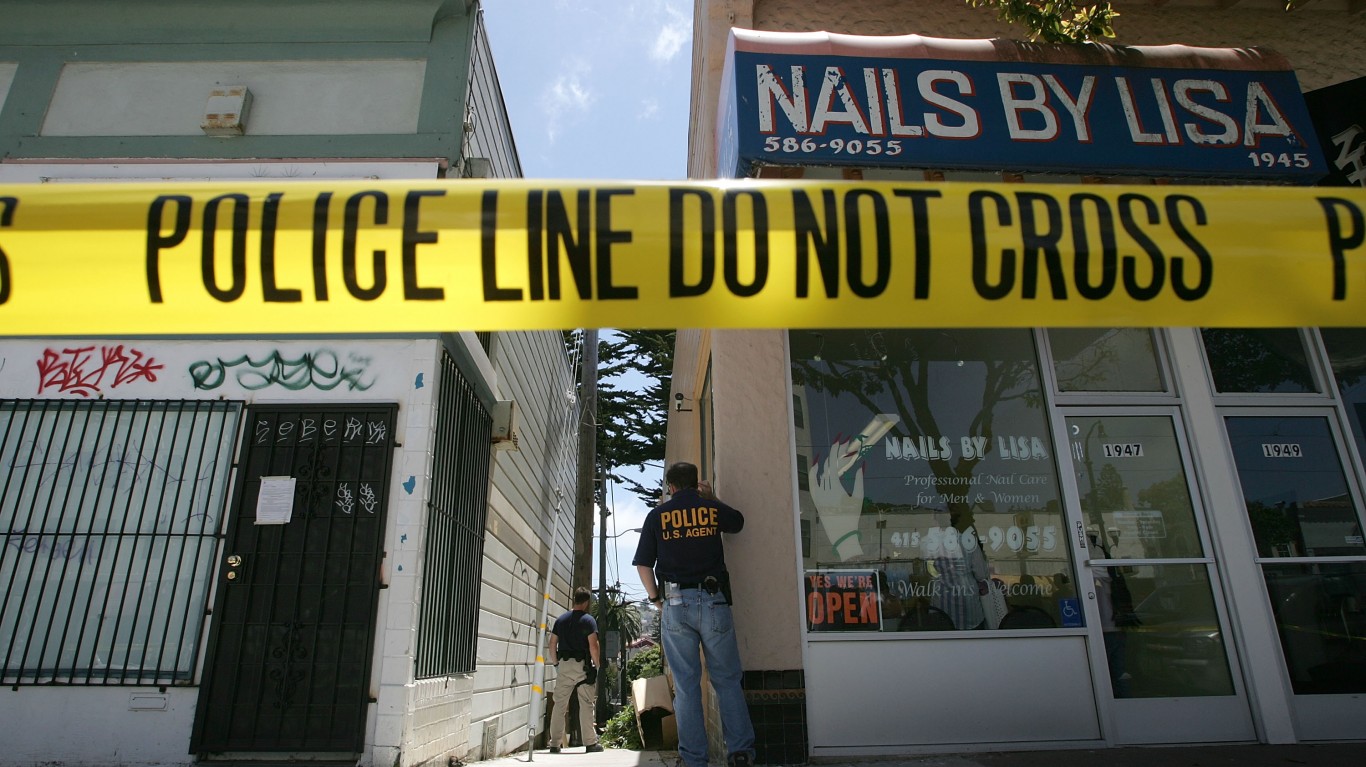
San Francisco, California
> Population, 2018: 883,305
> Police dept. funding as % of total budget, fiscal year 2020: 5.8% (3rd smallest out of 50 largest cities)
> Total police budget for fiscal 2020: $696 million (7th largest)
> Total city budget for fiscal 2020: $12.00 billion (3rd largest)
> Law enforcement employees per 100K: 330 (62nd highest out of 634 cities with 65K +)
> Total law enforcement employees: 2,913 (2,306 officers, 607 civilian employees)
> Violent crimes reported per 100K in 2018: 691 (108th highest out of 634 cities of 65K +)
San Francisco Mayor London Breed has consistently supported increases for her city’s police department. Now she is proposing major reforms, including a new class of unarmed officers who would respond to non-criminal complaints such as neighborhood disputes and school interventions. The city mayor wants to ban its police department from using military-grade weapons against unarmed civilians, including tear gas, bayonets and tanks.
The latest projections show San Francisco could see a $1.7 billion budget shortfall during the next two years.
[in-text-ad]
Columbus, Ohio
> Population, 2018: 895,877
> Police dept. funding as % of total budget, fiscal year 2020: 19.8% (14th largest out of 50 largest cities)
> Total police budget for fiscal 2020: $360 million (20th largest)
> Total city budget for fiscal 2020: $1.82 billion (24th largest)
> Law enforcement employees per 100K: 252 (145th highest out of 634 cities with 65K +)
> Total law enforcement employees: 2,255 (1,870 officers, 385 civilian employees)
> Violent crimes reported per 100K in 2018: 495 (185th highest out of 634 cities of 65K +)
Critics say Columbus spends far more on police than other Ohio cities, such as Cleveland and Cincinnati. And following the movement that erupted after the police killing of George Floyd in Minneapolis with calls to action on police reform, the city is now responding. In mid-June, Mayor Andrew Ginther said Columbus would adopt the “8 Can’t Wait” police reform proposals that center on de-escalation techniques that are being pushed nationwide.

Fort Worth, Texas
> Population, 2018: 898,919
> Police dept. funding as % of total budget, fiscal year 2020: 18.5% (16th largest out of 50 largest cities)
> Total police budget for fiscal 2020: $355 million (21st largest)
> Total city budget for fiscal 2020: $1.92 billion (22nd largest)
> Law enforcement employees per 100K: 237 (173rd highest out of 634 cities with 65K +)
> Total law enforcement employees: 2,132 (1,694 officers, 438 civilian employees)
> Violent crimes reported per 100K in 2018: 501 (180th highest out of 634 cities of 65K +)
Voters in Fort Worth will have a unique opportunity in July to directly weigh in on the “defund the police” issue. They will be voting on whether to renew the special police fund that has been around since 1995. Raised through a half-cent sales tax, the fund is designed to supplement the city’s budget for police. It was expected to bring in $88 million this year. Excluding this special fund, Fort Worth still has a sizable police budget, at $355 million.

Jacksonville, Florida
> Population, 2018: 903,896
> Police dept. funding as % of total budget, fiscal year 2020: 17.6% (20th largest out of 50 largest cities)
> Total police budget for fiscal 2020: $482 million (13th largest)
> Total city budget for fiscal 2020: $2.74 billion (16th largest)
> Law enforcement employees per 100K: 335 (55th highest out of 634 cities with 65K +)
> Total law enforcement employees: 3,032 (1,724 officers, 1308 civilian employees)
> Violent crimes reported per 100K in 2018: 596 (139th highest out of 634 cities of 65K +)
Incoming City Council President Tommy Hazouri says Black Lives Matter protesters’ voices are being heard. He has formed a new social justice committee to look at policing and economic development in poor neighborhoods. Meanwhile, Sheriff Mike Williams is arguing against any cuts to his department. He argues that communities of color would be disproportionately affected if his budget is reduced.
[in-text-ad-2]

Austin, Texas
> Population, 2018: 964,243
> Police dept. funding as % of total budget, fiscal year 2020: 8.9% (6th smallest out of 50 largest cities)
> Total police budget for fiscal 2020: $376 million (18th largest)
> Total city budget for fiscal 2020: $4.20 billion (9th largest)
> Law enforcement employees per 100K: 251 (146th highest out of 634 cities with 65K +)
> Total law enforcement employees: 2,422 (1,851 officers, 571 civilian employees)
> Violent crimes reported per 100K in 2018: 382 (261st highest out of 634 cities of 65K +)
Activists in Austin are pushing for a $100 million cut to the city’s police department for the next fiscal year, but Mayor Steve Adler is not yet on board. The city manager is proposing a reallocation of some public safety funds and the creation of advisory working groups that would explore how the city might change its funding priorities. Right now, the Austin police department budget is twice as large as the city’s fire department’s budget.

San Jose, California
> Population, 2018: 1,030,119
> Police dept. funding as % of total budget, fiscal year 2020: 14.5% (20th smallest out of 50 largest cities)
> Total police budget for fiscal 2020: $449 million (15th largest)
> Total city budget for fiscal 2020: $3.09 billion (13th largest)
> Law enforcement employees per 100K: 150 (418th highest out of 634 cities with 65K +)
> Total law enforcement employees: 1,550 (1,113 officers, 437 civilian employees)
> Violent crimes reported per 100K in 2018: 424 (229th highest out of 634 cities of 65K +)
In approving a new budget in mid-June, the city council voted to create a new Office of Racial Equality. That office will have a budget of $1.5 million. In another small move, the city allocated $15,000 for updating the police auditor’s website. The budgeted upgrade should allow citizens to upload photos and videos to the website when they file complaints against the police.
As San Jose finalizes its budget for the next fiscal year, the police department could see a minimal cut, $10 million, due to a revenue crunch caused by COVID-19.
[in-text-ad]

Dallas, Texas
> Population, 2018: 1,345,076
> Police dept. funding as % of total budget, fiscal year 2020: 13.6% (18th smallest out of 50 largest cities)
> Total police budget for fiscal 2020: $517 million (12th largest)
> Total city budget for fiscal 2020: $3.79 billion (10th largest)
> Law enforcement employees per 100K: 266 (118th highest out of 634 cities with 65K +)
> Total law enforcement employees: 3,581 (3,007 officers, 574 civilian employees)
> Violent crimes reported per 100K in 2018: 765 (82nd highest out of 634 cities of 65K +)
Facing a coronavirus-related budget shortfall of up to $100 million for the next fiscal year, Dallas has some hard choices to make. And the national debate about public safety funding is playing into that. Scheduled to present the next budget in August, the city manager is weighing multiple scenarios. In the end, many city departments, including the police, could see cuts. Public safety (including fire and police) is by far the largest expenditure for the city.
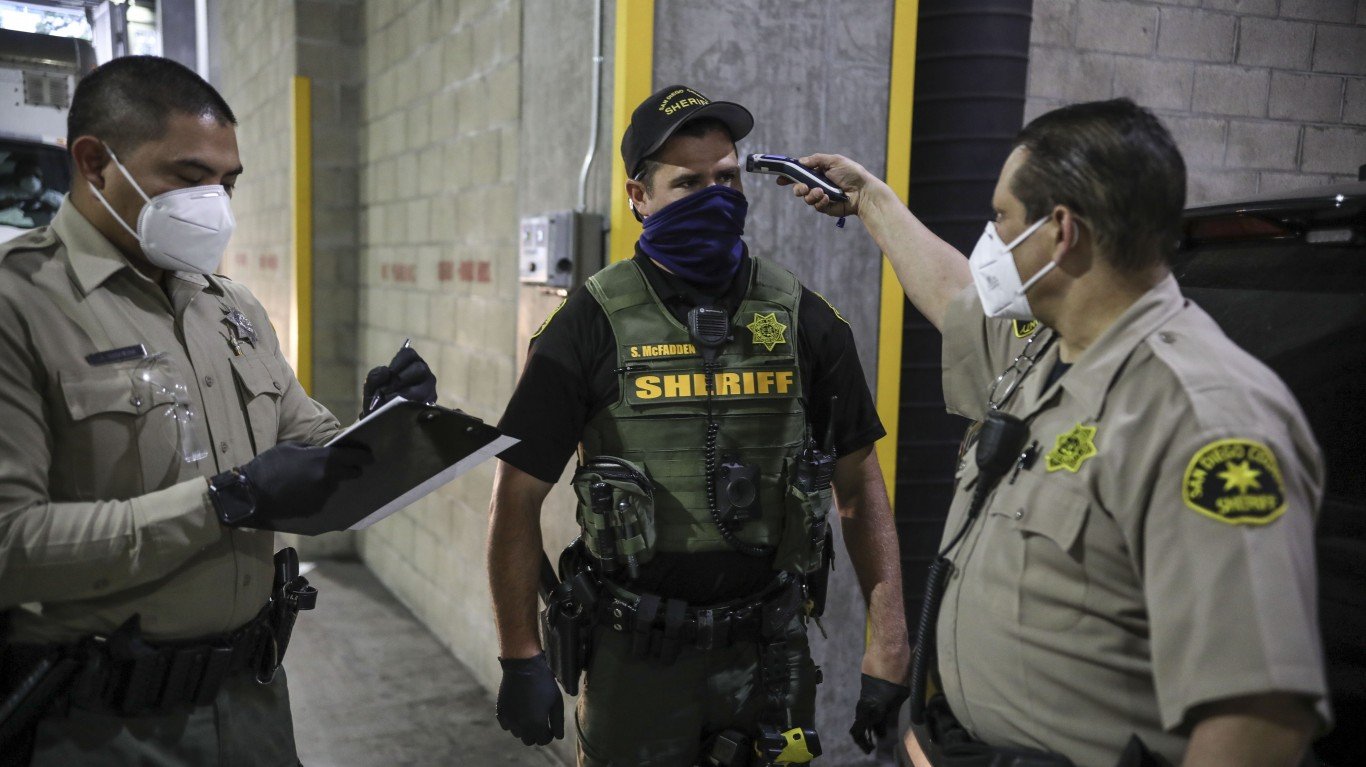
San Diego, California
> Population, 2018: 1,425,999
> Police dept. funding as % of total budget, fiscal year 2020: 36.8% (3rd largest out of 50 largest cities)
> Total police budget for fiscal 2021: $566 million (9th largest)
> Total city budget for fiscal 2021: $1.54 billion (21st smallest)
> Law enforcement employees per 100K: 164 (379th highest out of 634 cities with 65K +)
> Total law enforcement employees: 2,332 (1,731 officers, 601 civilian employees)
> Violent crimes reported per 100K in 2018: 373 (272nd highest out of 634 cities of 65K +)
Over 4,400 city residents called and emailed the San Diego City Council in June, asking that the city divert police funding to rent relief, mental health services, and more. Instead, the council voted to increase the police budget to fund already-approved pay raises for the police as well as expenses related to COVID-19. The council, however, did agree to create a new $3.8 million Office on Race and Equity, and the city recently banned the use of chokeholds by police.
The police department is the largest expense for the city’s general fund, followed by fire/rescue.
San Antonio, Texas
> Population, 2018: 1,532,212
> Police dept. funding as % of total budget, fiscal year 2020: 21.6% (9th largest out of 50 largest cities)
> Total police budget for fiscal 2020: $479 million (14th largest)
> Total city budget for fiscal 2020: $2.22 billion (19th largest)
> Law enforcement employees per 100K: 195 (283rd highest out of 634 cities with 65K +)
> Total law enforcement employees: 2,991 (2,352 officers, 639 civilian employees)
> Violent crimes reported per 100K in 2018: 627 (127th highest out of 634 cities of 65K +)
A familiar scenario is playing out in San Antonio, with some local residents calling for cuts to the police department, and the police chief pushing back. Protesters recently filled San Antonio City Council chambers demanding change, but in the end, the SAPD saw only a small cut of $4.4 million during a mid-year budget adjustment. A new city budget, to be voted on in August, could include additional cuts. The city manager is proposing the elimination of nearly 100 police positions.
[in-text-ad-2]
Philadelphia, Pennsylvania
> Population, 2018: 1,584,138
> Police dept. funding as % of total budget, fiscal year 2020: 15.2% (24th smallest out of 50 largest cities)
> Total police budget for fiscal 2021: $760 million (5th largest)
> Total city budget for fiscal 2021: $5.00 billion (8th largest)
> Law enforcement employees per 100K: 465 (12th highest out of 634 cities with 65K +)
> Total law enforcement employees: 7,366 (6,577 officers, 789 civilian employees)
> Violent crimes reported per 100K in 2018: 909 (55th highest out of 634 cities of 65K +)
Protesters’ calls to “defund the police” come at a time of huge budget shortfalls due to the coronavirus pandemic, and some cities may be forced to cut police budgets even if they did not intend to. In Philadelphia, tax receipts have plummeted in the wake of the COVID-19 economic fallout, and now the city is facing a $749 million budget deficit this year.
A preliminary Philadelphia city budget in June cut $33 million from the police department (about 4% of the police budget and less than 1% of the total city budget). The budget also calls for several reform measures, including body cameras and anti-bias training. In the 2021 budget, the police and pensions are the largest expenditures for Philly.
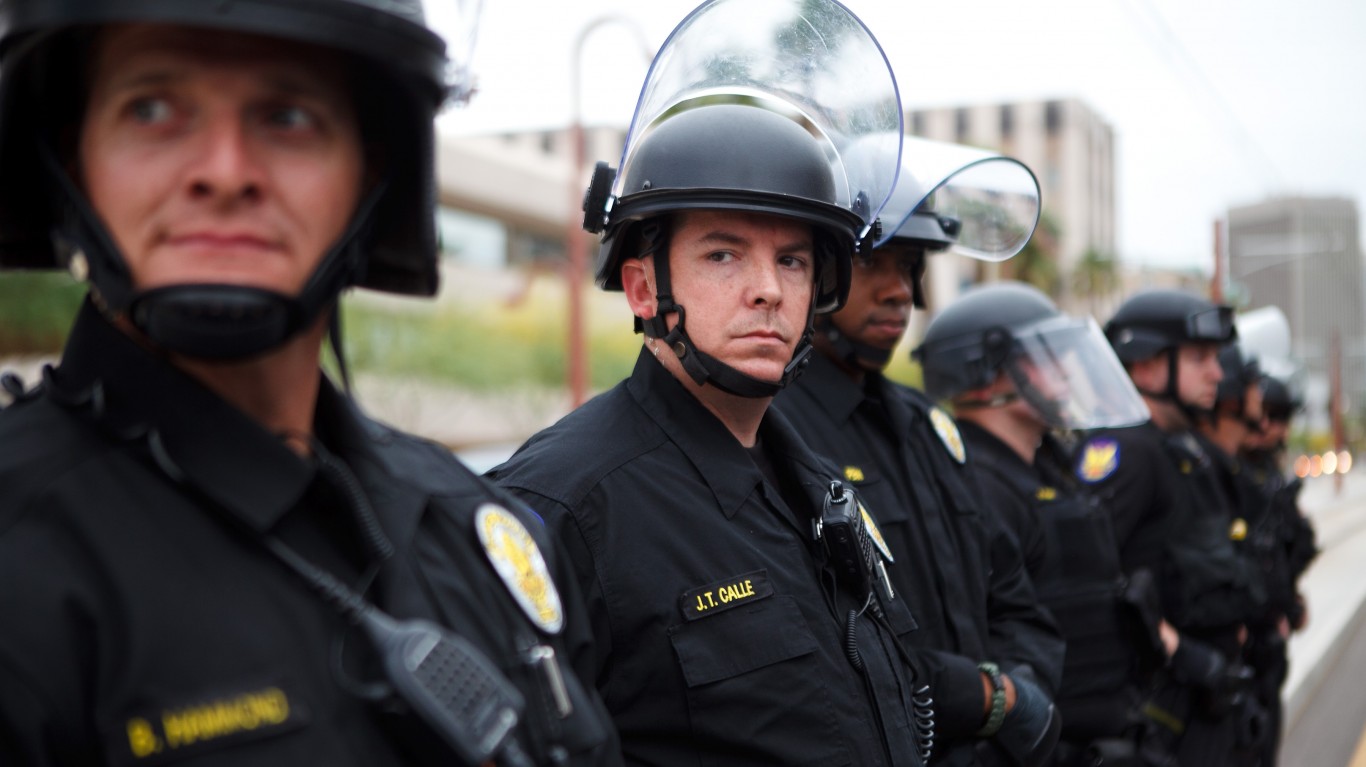
Phoenix, Arizona
> Population, 2018: 1,660,272
> Police dept. funding as % of total budget, fiscal year 2020: 22.0% (8th largest out of 50 largest cities)
> Total police budget for fiscal 2021: $721 million (6th largest)
> Total city budget for fiscal 2021: $3.27 billion (12th largest)
> Law enforcement employees per 100K: 235 (177th highest out of 634 cities with 65K +)
> Total law enforcement employees: 3,902 (2,919 officers, 983 civilian employees)
> Violent crimes reported per 100K in 2018: 733 (94th highest out of 634 cities of 65K +)
In approving its new budget, the Phoenix City Council authorized $3 million for a new police oversight budget. The council narrowly rejected requests to cut the overall police budget, which is currently budgeted at $745 million for the new year. Critics have been pushing for changes after the city saw a record number of police shootings in 2018. Phoenix spends more on police than any other department. The fire department comes in second (about $350 million), followed by parks and recreation (about $100 million).
[in-text-ad]
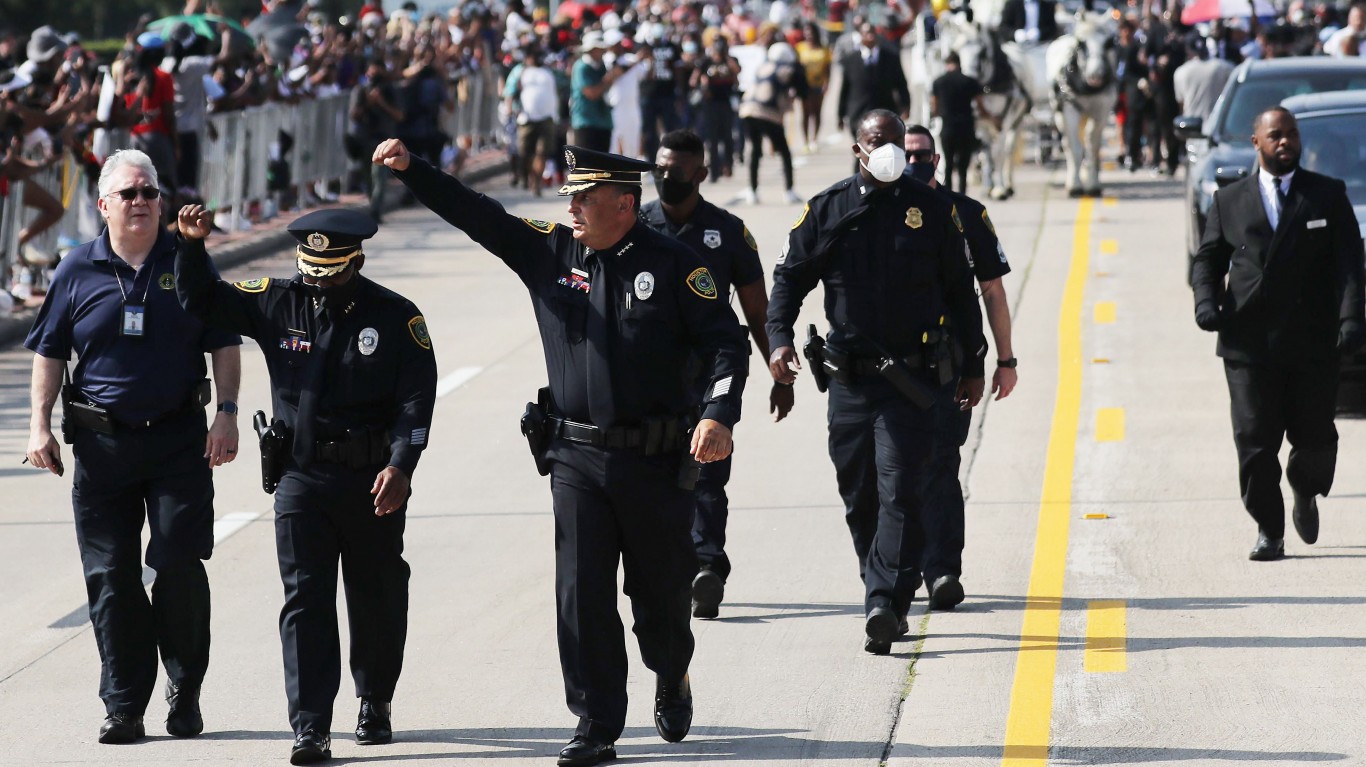
Houston, Texas
> Population, 2018: 2,326,090
> Police dept. funding as % of total budget, fiscal year 2020: 17.3% (21st largest out of 50 largest cities)
> Total police budget for fiscal 2021: $965 million (4th largest)
> Total city budget for fiscal 2021: $5.56 billion (6th largest)
> Law enforcement employees per 100K: 269 (110th highest out of 634 cities with 65K +)
> Total law enforcement employees: 6,258 (5,229 officers, 1029 civilian employees)
> Violent crimes reported per 100K in 2018: 1,026 (37th highest out of 634 cities of 65K +)
Amid calls to reallocate police resources, Houston leaders raised their police budget from $945 million last year to $965 million this year. The mayor’s office said the increase was due to fixed costs such as salaries and pensions. Houston Police Chief Art Acevedo recently testified before the U.S. Congress that cutting police budgets is not the best way to address police brutality. The police department is the largest line item in the city’s budget, with the fire department budget half as large.

Chicago, Illinois
> Population, 2018: 2,705,988
> Police dept. funding as % of total budget, fiscal year 2020: 15.3% (25th smallest out of 50 largest cities)
> Total police budget for fiscal 2020: $2 billion (3rd largest)
> Total city budget for fiscal 2020: $11.65 billion (4th largest)
> Law enforcement employees per 100K: 521 (7th highest out of 634 cities with 65K +)
> Total law enforcement employees: 14,086 (13,138 officers, 948 civilian employees)
> Violent crimes reported per 100K in 2018: 1,006 (39th highest out of 634 cities of 65K +)
Of all of America’s big cities, Chicago has had among the worst problems with gun violence, largely concentrated in poor neighborhoods.
A 2016 task force found systemic racism within the city’s police department. The report led to a series of reforms, including new policies on the use of force and equipping all officers with tasers. In June, Mayor Lori Lightfoot announced a new committee to review the police department’s use of force policies. Public safety, which includes police and fire departments, is the largest expenditure for the city. Of the 85,663 arrests Chicago police made in 2018, 62,901 or about three quarters were of Black residents. Black Chicagoans make up about 30% of the city’s population.
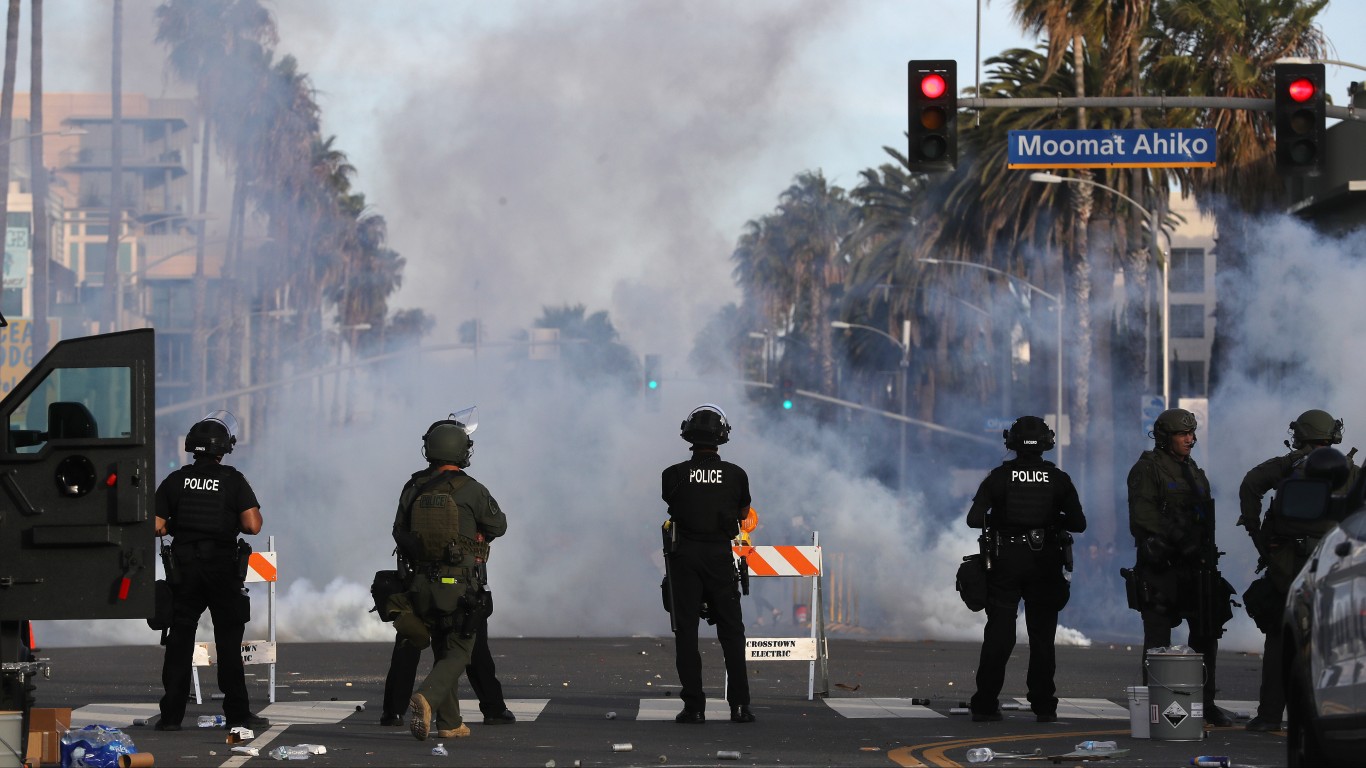
Los Angeles, California
> Population, 2018: 3,990,469
> Police dept. funding as % of total budget, fiscal year 2020: 17.6% (19th largest out of 50 largest cities)
> Total police budget for fiscal 2021: $2 billion (2nd largest)
> Total city budget for fiscal 2021: $10.53 billion (5th largest)
> Law enforcement employees per 100K: 326 (66th highest out of 634 cities with 65K +)
> Total law enforcement employees: 13,010 (9,974 officers, 3,036 civilian employees)
> Violent crimes reported per 100K in 2018: 748 (86th highest out of 634 cities of 65K +)
America’s second largest city spends 17.6% of its annual budget on policing, the second largest budget expenditure after retirement and pension funds. Responding to protesters against police brutality in the wake of George Floyd’s killing by Minneapolis police, a city council committee voted in June to cut $150 million from the police budget. As the city’s budget is still being negotiated, the Board of Police Commissioners has committed to identifying up to $150 million in cuts.
[in-text-ad-2]
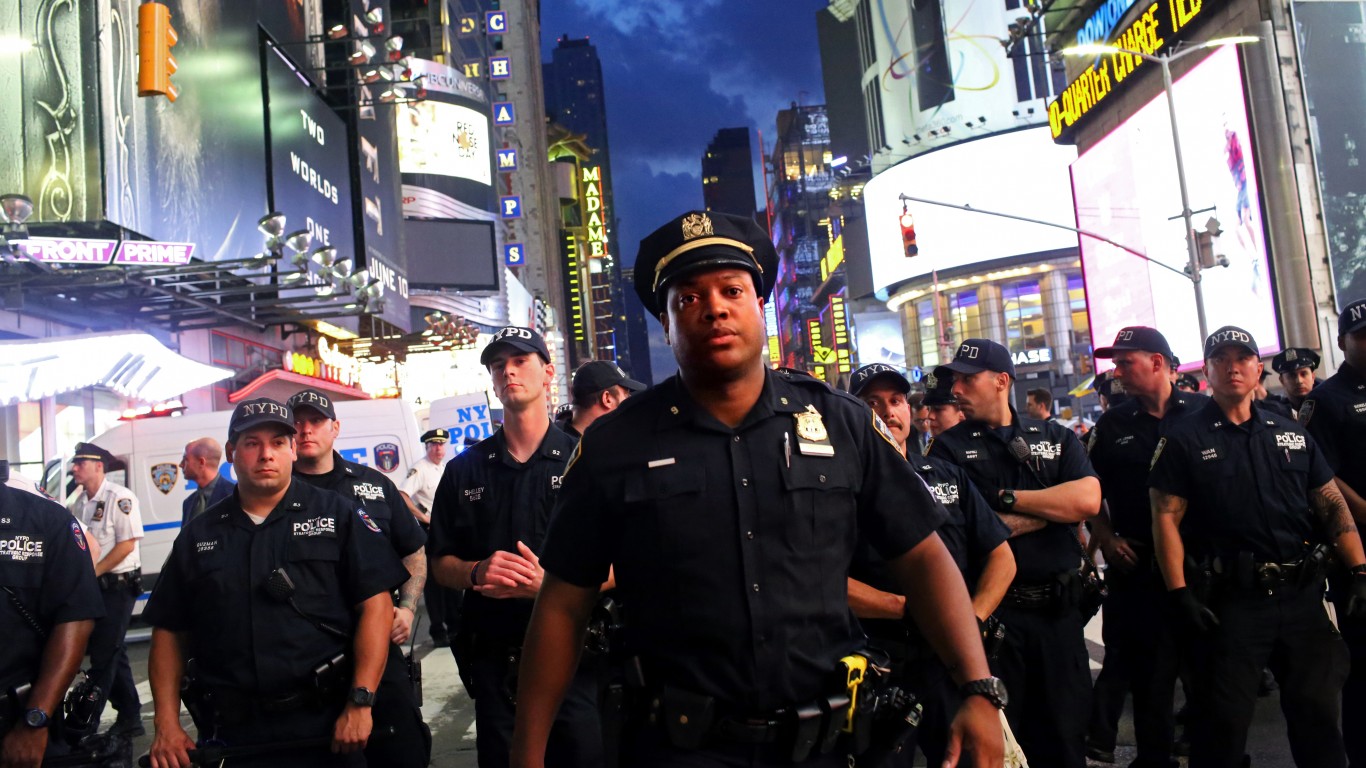
New York, New York
> Population, 2018: 8,398,748
> Police dept. funding as % of total budget, fiscal year 2020: 5.9% (4th smallest out of 50 largest cities)
> Total police budget for fiscal 2021: $6 billion (the largest)
> Total city budget for fiscal 2021: $95.30 billion (the largest)
> Law enforcement employees per 100K: 622 (3rd highest out of 634 cities with 65K +)
> Total law enforcement employees: 52,278 (36,134 officers, 16,144 civilian employees)
> Violent crimes reported per 100K in 2018: 541 (162nd highest out of 634 cities of 65K +)
America’s largest city has a police budget of over $5.5 billion. Percentage-wise, however, New York City police spending is not that high, at nearly 6% of the city’s total budget. The city spends much more on education and social services. Still the “defund police” movement has traction with the New York City Council, which is backing a proposal to cut $1 billion from the police budget. And Gov. Andrew Cuomo signed a new law that requires all police agencies to “reform themselves” in order to qualify for state funding. While New York City spends more on policing than any other U.S. city, it should also be noted that the Big Apple faces a unique challenge: the city is a potential target for terrorists. Last year, the NYPD spent $187 million on counterterrorism and intelligence activities.
Sponsored: Find a Qualified Financial Advisor
Finding a qualified financial advisor doesn’t have to be hard. SmartAsset’s free tool matches you with up to 3 fiduciary financial advisors in your area in 5 minutes. Each advisor has been vetted by SmartAsset and is held to a fiduciary standard to act in your best interests. If you’re ready to be matched with local advisors that can help you achieve your financial goals, get started now.
Thank you for reading! Have some feedback for us?
Contact the 24/7 Wall St. editorial team.

 24/7 Wall St.
24/7 Wall St.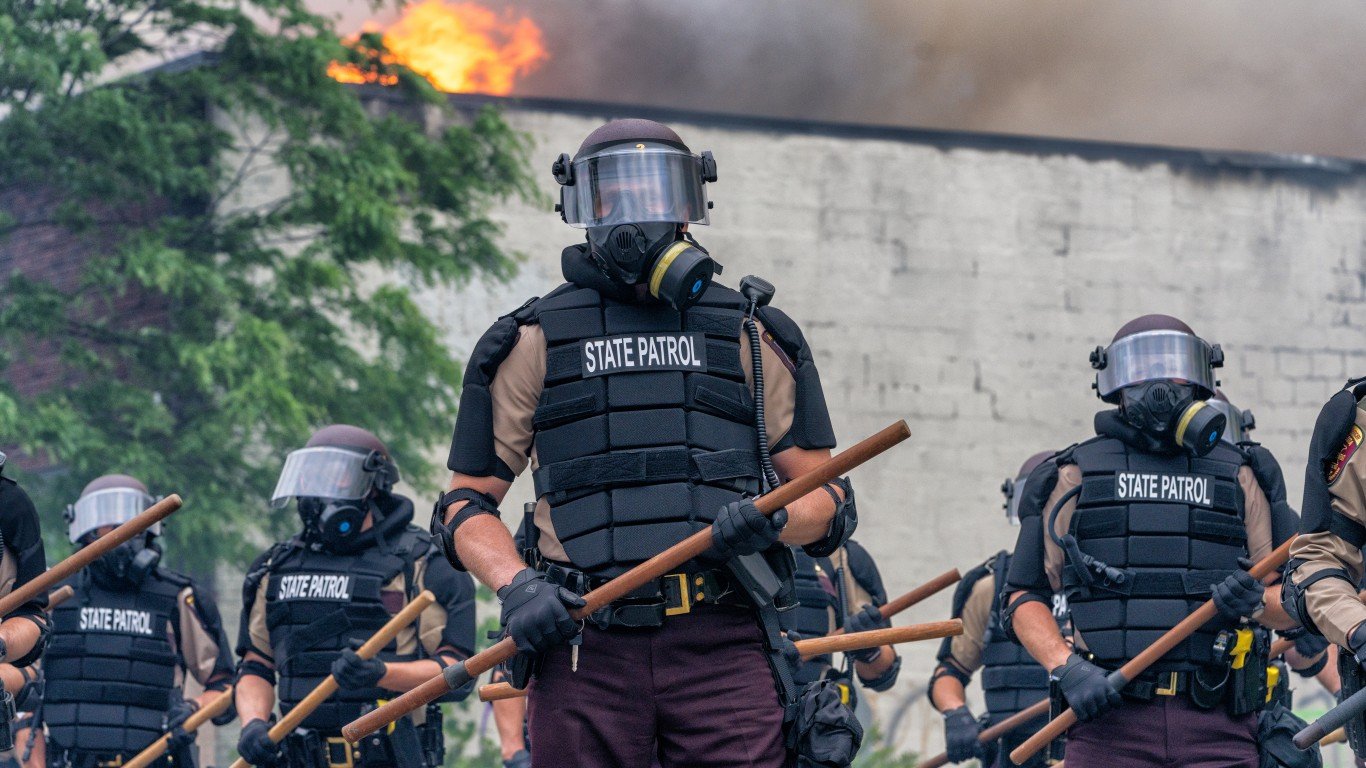
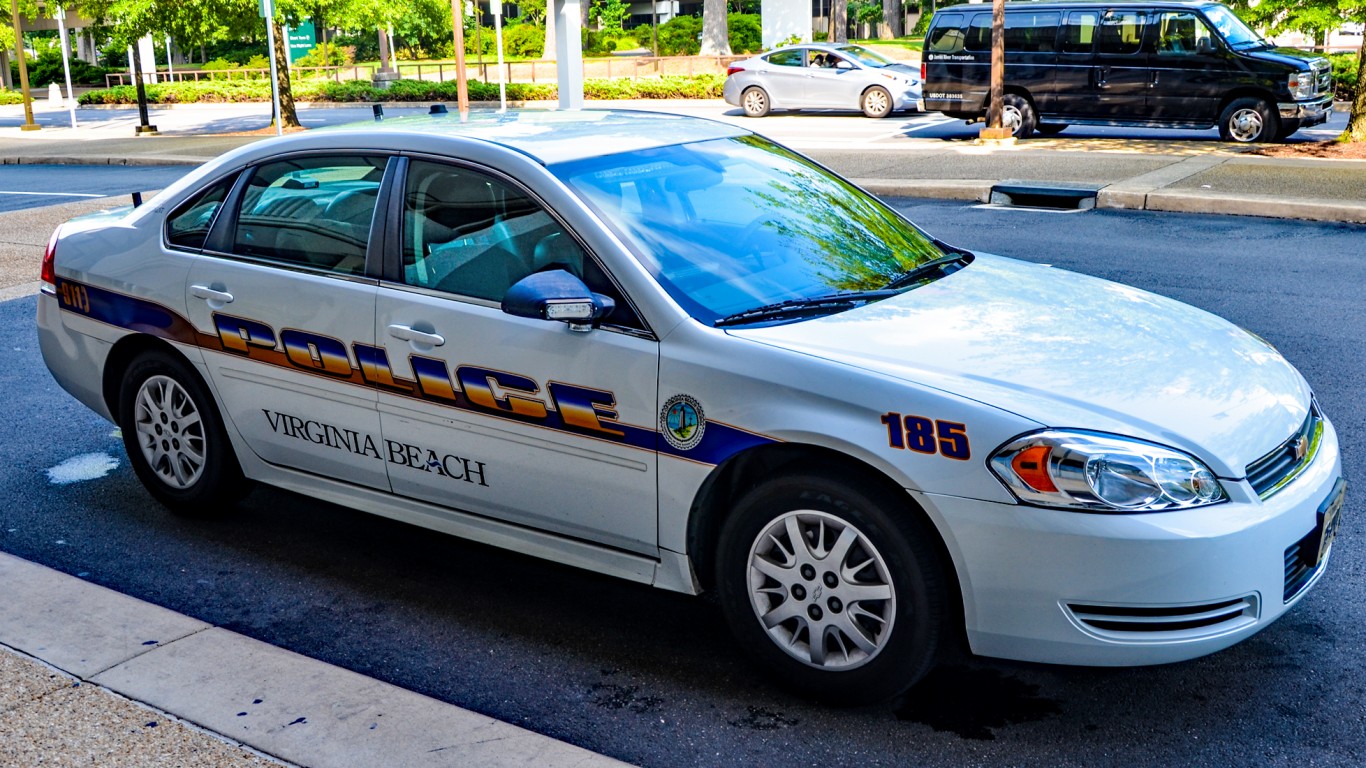
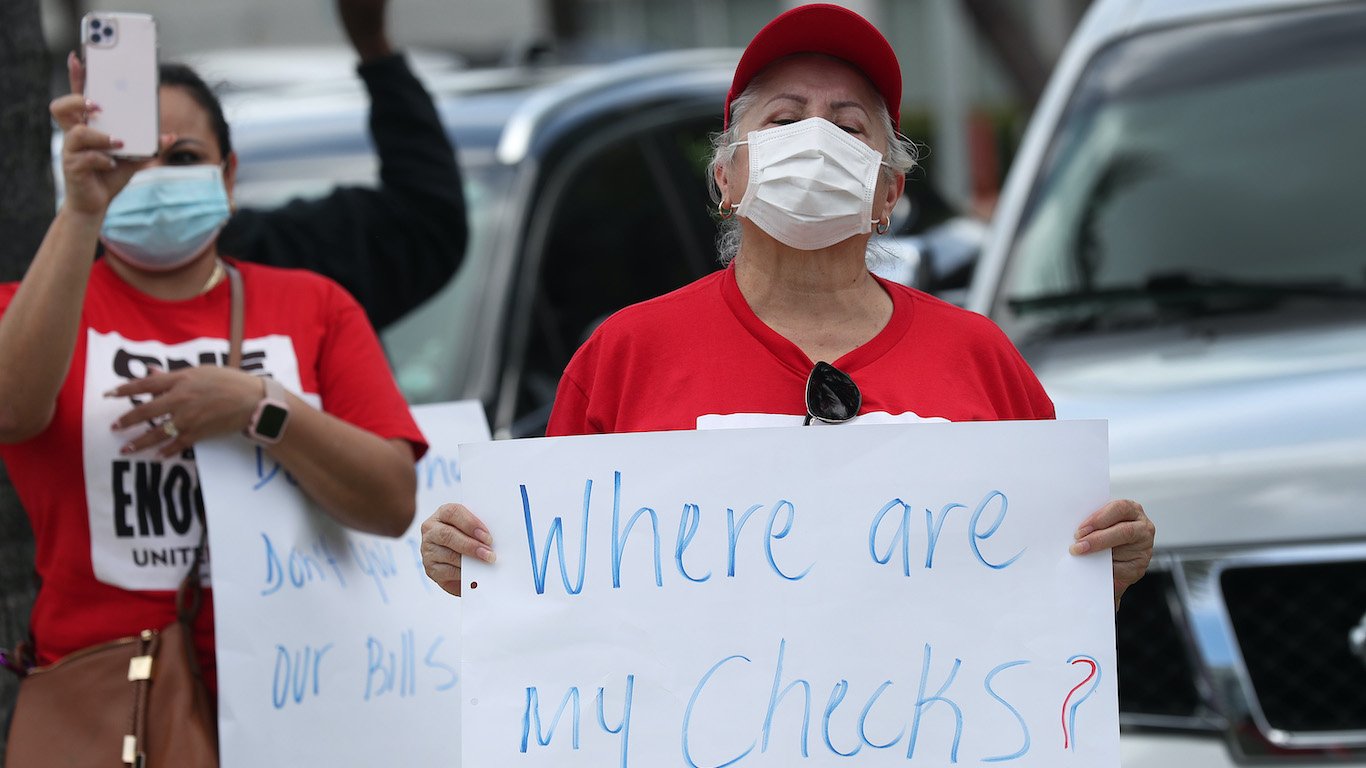 24/7 Wall St.
24/7 Wall St.
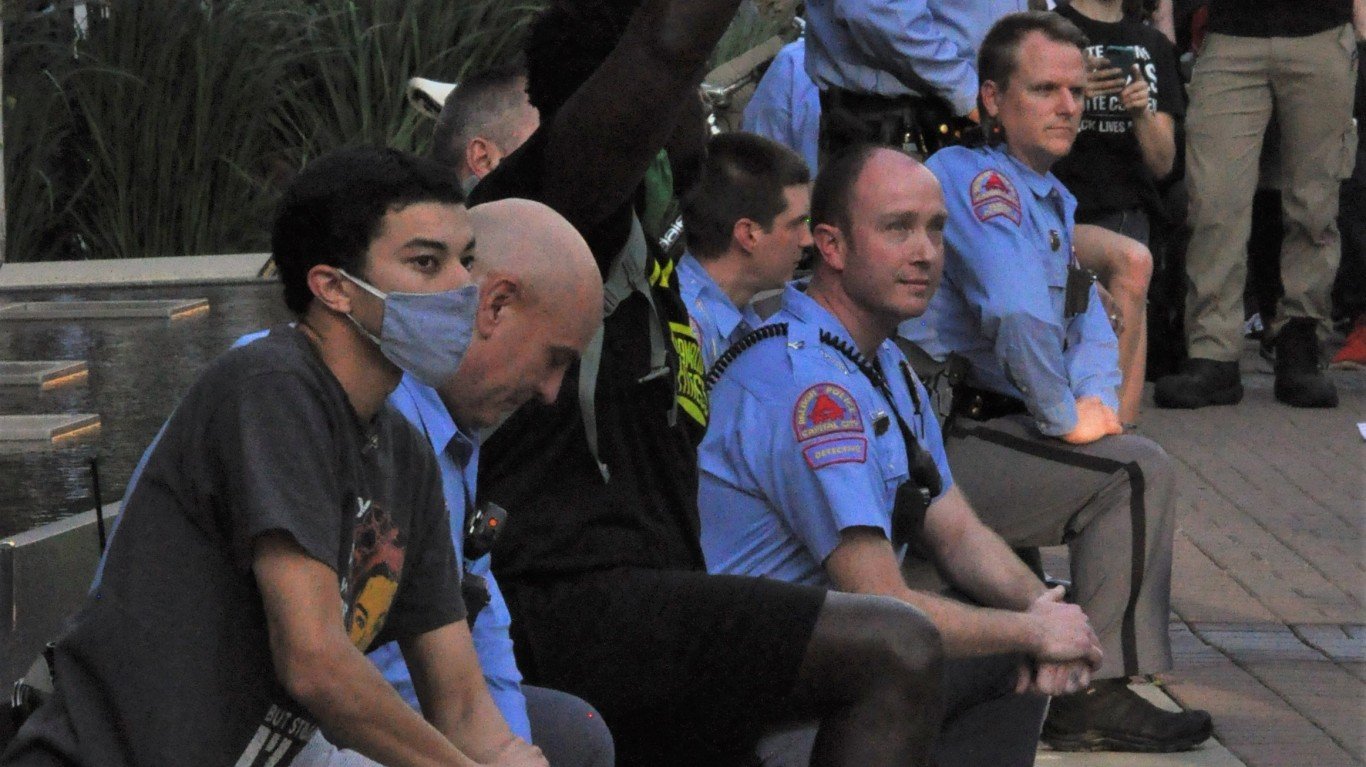

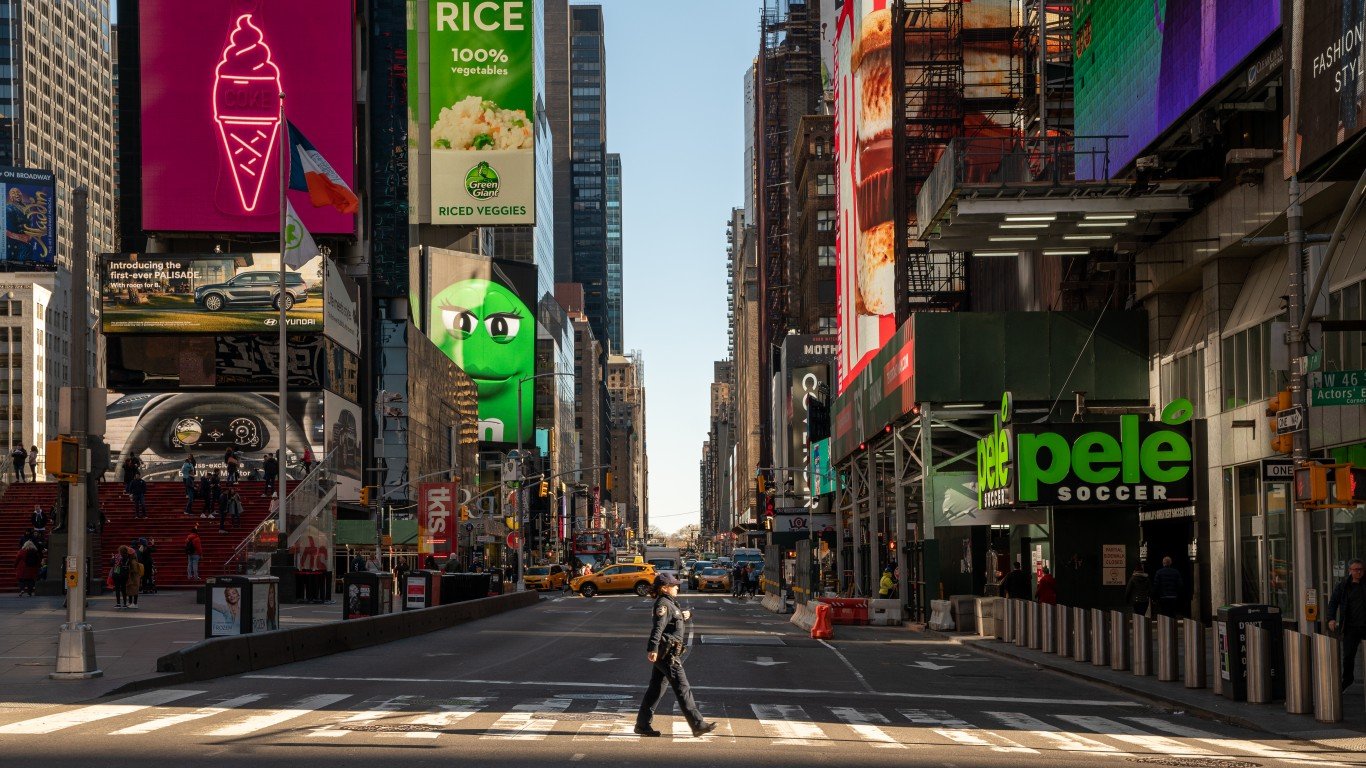 24/7 Wall St.
24/7 Wall St.



 24/7 Wall St.
24/7 Wall St.
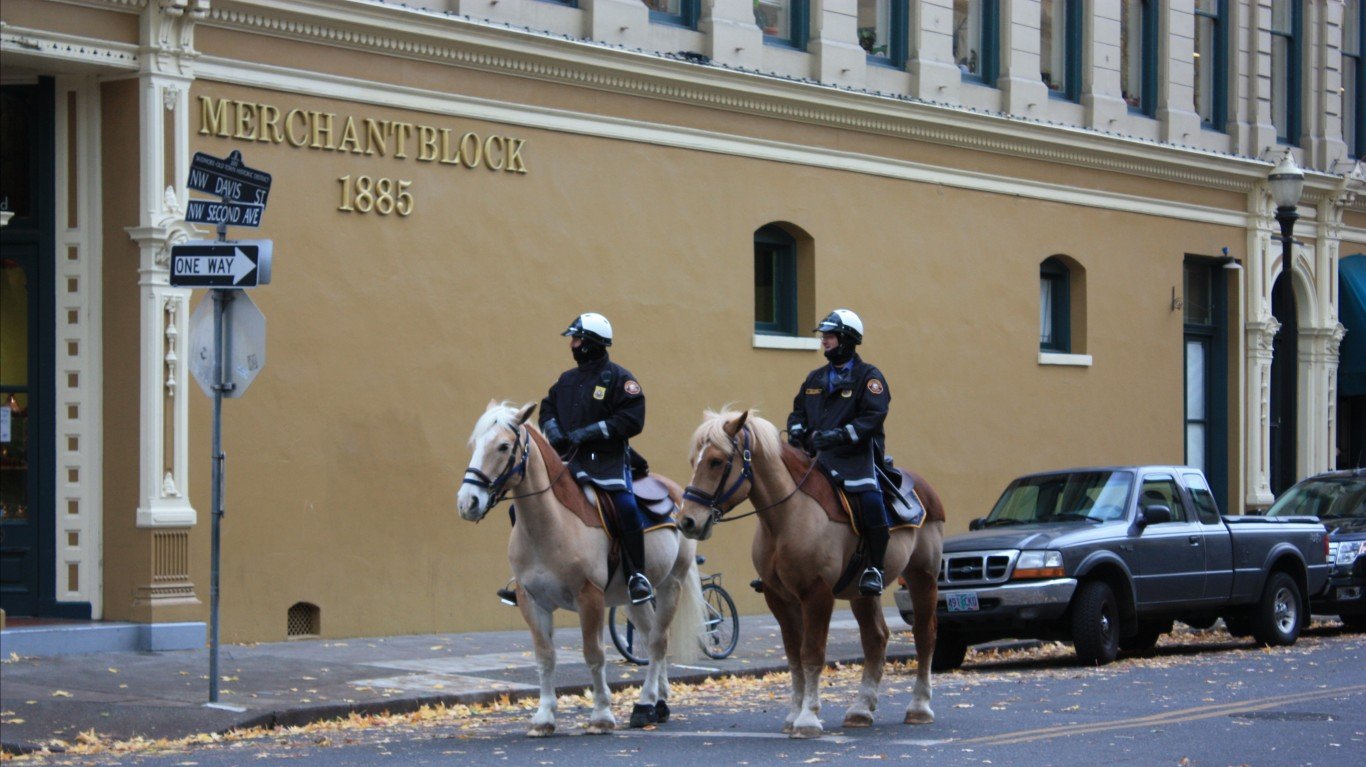
 24/7 Wall St.
24/7 Wall St.
